| The Maritime Security Forum is pleased to provide you with a product, in the form of a daily newsletter, through which we present the most relevant events and information on naval issues, especially those related to maritime security and other related areas. It aims to present a clear and concise assessment of the most recent and relevant news in this area, with references to sources of information. We hope that this newsletter will prove to be a useful resource for you, providing a comprehensive insight into the complicated context of the field for both specialists and anyone interested in the dynamics of events in the field of maritime security. |

Trump’s Davos Speech in 3 Minutes
MS Daily brief-22 January 2026

READ ALSO THE ARTICLE
From Davos to the White House: Donald Trump’s Peace Council and Romania’s dilemma
Contents
News from Ukraine | Russian oil fleet suffers heavy losses | Trump’s situation is crazy. 1
Trump’s statement on the Greenland framework agreement was met with scepticism as doubts persist 1
Trump drops threat to impose tariffs on Greenland, citing vague “agreement” on territory. 3
Trump presents himself as a great white hope in a racist speech at Davos. 6
Update on the war in Ukraine: Zelenskyy is expected in Davos to meet with Trump. 11
Starmer toughens his rhetoric towards Trump and condemns pressure on Greenland. 12
A strengthened Starmer changes tactics as a gentle approach fails to influence Trump. 14
Are middle powers gathering? Trump’s chaos sparks talk of new liberal alliances. 16
Trump says Canada should be grateful for the “gifts” it receives from the US. 18
Keir Starmer to visit China with British business leaders next week, according to reports. 20
Netanyahu joins Trump’s “peace council” despite previous objections. 22
NATO’s revised maritime strategy and North Sea security. 24
A radical transformation of maritime autonomous surface ships (MASS) 26
TTB 2026: USCG cybersecurity rules raise the stakes for ship operators. 28
USNI News Fleet and Marine Tracker: 20 January 2026. 30
Aircraft carrier Lincoln leaves South China Sea, USS Tripoli back at sea. 31
Turkey’s TAIS signs $1 billion frigate deal with Qatar’s Barzan for Indonesia. 32
HII demonstrations coordinated USV-UUV operations using autonomy software. 33
Textron unveils fifth-generation USV with dual payload and extended range. 35
Analysis of China’s 15th Five-Year Plan and its expected impact on China’s military modernisation 37
Dutch warship just took down a swarm of attack drones off the coast of the Kingdom.. 40
US captures another tanker in the context of Venezuelan oil transfer to Caribbean storage. 52
High stakes in the High North. 54
The meaning of “America First” is changing. 57
Ukraine receives drone from Latvia’s fog surface. 59
EU freezes approval of US trade deal over Trump’s threats to Greenland. 60
The French Navy launches the DANAE project to rapidly acquire an armed surface drone. 62
The Bundeswehr is preparing for a major acquisition: three warships for the German fleet 64
BREAKING NEWS: Trump threatens to destroy Iran; ISIS escapes as clashes erupt in Syria | TBN Israel
News from Ukraine | Russian oil fleet suffers heavy losses | Trump’s situation is crazy
Trump’s statement on the framework agreement for Greenland has been met with scepticism as doubts persist
NATO chief Mark Rutte says “there is still a lot to do,” while some Danish lawmakers express concern that Greenland appears to be left out of the American president’s discussions
Thursday, 22 January 2026, 03:49 CET
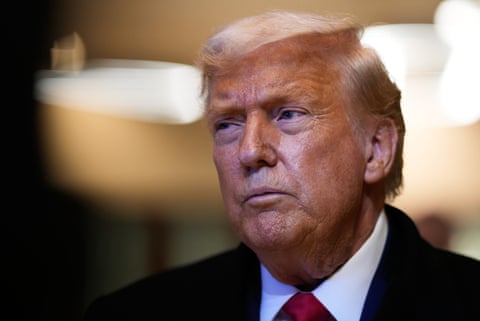
Donald Trump’s announcement of a “framework for a future deal” that would resolve the issue of Greenland after weeks of increasingly intense threats has been met with deep scepticism by the inhabitants of the Arctic territory, even as financial markets rallied and European leaders welcomed the postponement of new tariffs.
Just hours after the president used his speech at the World Economic Forum to insist that he wants Greenland, “including the rights, titles and property,” but distanced himself from his more bellicose threats of military intervention, Trump took to social media to announce “the framework of a future agreement on Greenland” after talks with NATO Secretary General Mark Rutte and withdrew his threat of tariffs against eight European countries. He later called it “a concept of an agreement” when speaking to the CNBC business network shortly after Wall Street closed.
“The day ended better than it started,” said Danish Foreign Minister Lars Løkke Rasmussen. “Now let’s sit down at the table and see how we can address American security concerns in the Arctic while respecting the limits imposed by the Kingdom of Denmark,” he said.
Italian Prime Minister Giorgia Meloni also welcomed Trump’s decision, but Rutte, who negotiated Wednesday’s agreement with Trump, issued a note of caution, saying that “there is still much to be done.”
When asked by Fox News whether Greenland would remain part of the Kingdom of Denmark under the agreement, Rutte replied that the issue had not been addressed and offered few additional details about the agreement. NATO spokesperson Allison Hart said discussions on the framework Trump referred to would focus on ensuring Arctic security “through the collective efforts of allies.”
But some Danish lawmakers, including Sascha Faxe, were outraged that Greenland was excluded from Wednesday’s talks.
“These are not real negotiations, just a conversation between two people,” she told Sky News. “There can be no agreement without Greenland being part of the negotiations.”
According to media reports, the compromise agreement could grant the US sovereignty over small areas of Greenland where military bases are located, and anonymous officials in The Telegraph compared the proposal to British military bases in Cyprus, which are considered British territory.
The framework could also allow the US to exploit rare minerals without seeking Denmark’s permission, according to The Telegraph.
It is unclear whether Denmark has signed the agreement, but on Wednesday evening, Aaja Chemnitz Larsen, a Greenlandic member of the Danish parliament, said that the idea of NATO having a say over the territory’s sovereignty or minerals was “completely out of the question”.
After days of mounting tensions, which signalled the deepest rift in transatlantic relations in decades — and prompted Canadian Prime Minister Mark Carney to deliver an emotional speech on Tuesday in defence of the rules-based order — the reasons why Trump appears to have backed down remain unclear.
Swedish Foreign Minister Maria Stenergard said the efforts of European allies “had an effect” and reiterated that they would not be “blackmailed”.
Dutch Prime Minister Dick Schoof described Trump’s decision to drop the threat of imposing tariffs on European allies as a sign of “de-escalation,” and EU leaders are now set to discuss their options at an emergency summit in Brussels on Thursday.
Others pointed to the fluctuations in financial markets after Trump’s more aggressive comments on Greenland on Tuesday led to a sell-off in US stock markets. Global markets rebounded on Wednesday after Trump announced the framework agreement and dropped the tariff threat.
“The market rebounded when he said we weren’t going to use force,” said Mark Hackett, chief market strategist at Nationwide in Boston, while financial analyst Matthew Smart said “the uncertainty has just been removed.”
Others noted that Trump has a history of making increasingly intense threats, only to back down when financial markets start to fall. After putting the brakes on the global trade war in April last year following a market crash, the Financial Times coined the acronym “Taco” — “Trump Always Chickens Out” — to describe the phenomenon.
The American publication Semafor reported that Trump seemed frustrated by this week’s market developments and noted that his antagonism towards European allies carries enormous risks.
“Countries such as Britain, Belgium and France hold trillions of dollars in American assets, such as government bonds. If they decide to sell them, this could cause interest rates to skyrocket,” wrote reporter Eleanor Mueller.
Michael McFaul, former US ambassador to Russia and an outspoken critic of Trump, suggested that the change in tone was the result of a series of pressures on the president: “The Europeans, the market, other American politicians, the independent media and public opinion have all come together to stop Trump’s crazy gambit to invade and annex Greenland.”
In Greenland, however, Trump’s announcement was met with deep scepticism.
“He’s lying,” said a resident of the capital Nuuk, interviewed by AFP news agency.
This sentiment was shared by Anak, a social worker, who told AFP: “Greenland belongs to the Greenlanders.”
Trump drops threat to impose tariffs on Greenland, citing vague “agreement” on territory
The US president says a “framework” agreement is being worked on after a “very productive” meeting with the NATO secretary general
Lauren Aratani in New York and Andrew Roth
Thursday, 22 January 2026, 04:01 CET
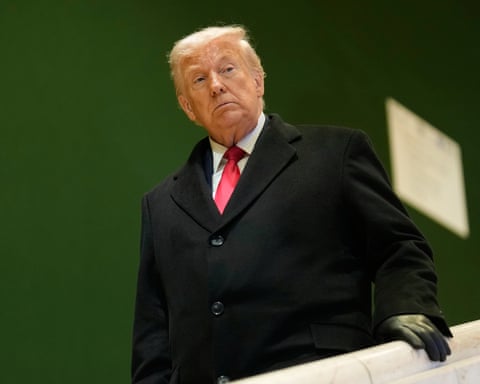
Donald Trump has withdrawn his threat to impose drastic US tariffs on eight European countries, claiming he has agreed on the “framework of a future agreement” on Greenland.
Four days after promising to impose steep import taxes on a number of US allies for their support of Greenland’s status as a Danish autonomous territory, the president has backed down.
The US will not impose 10% tariffs on Denmark, Norway, Sweden, France, Germany, the United Kingdom, the Netherlands and Finland from 1 February, Trump wrote on his social media platform Truth Social. Over the weekend, he threatened to raise tariffs to 25% from 1 June.
The threat sparked widespread concern, criticism from senior European politicians, who said they would not be “blackmailed,” and warnings from economists.
After what he called a “very productive” meeting with NATO Secretary General Mark Rutte on Wednesday, Trump said he had established the “framework” for an agreement on Greenland, without providing further details.
“Based on this understanding, I will not impose the tariffs that were to take effect on 1 February,” the president said.
Trump did not provide further details about the agreement, but said talks were continuing on a US missile defence shield that would be partly based in Greenland.
The agreement will be in effect “forever,” he said at the economic forum in Davos, Switzerland. “We have an idea of an agreement. I think it will be a very good agreement for the United States, but also for them,” Trump told CNBC, the financial news network. “It’s a little complex, but we’ll explain everything in detail.”
NATO spokeswoman Allison Hart said: “Discussions among NATO allies on the framework mentioned by the president will focus on ensuring the security of the Arctic through the collective efforts of allies, particularly the seven Arctic allies.
She added: “Negotiations between Denmark, Greenland and the United States will continue with the aim of ensuring that Russia and China never gain a foothold – economic or military – in Greenland.”
But Rutte, the alliance’s secretary general, was cautious. “I think it was a very good meeting tonight,” he told AFP news agency. “But there is still a lot to be done.”
Denmark’s foreign minister said Trump had sent positive signals, saying he would not use military force to conquer Greenland.
“Trump said he would suspend the trade war. He said, ‘I will not attack Greenland’. These are positive messages,” Lars Løkke Rasmussen told Danish public television DR.
Trump “also had a fruitful conversation with the NATO secretary general,” he said, without giving details.
At a NATO meeting on Wednesday, military officers from the transatlantic alliance’s member states discussed a compromise whereby the US would receive sovereignty over small areas of Greenland, the New York Times reported, citing three anonymous senior officials. Two of the officials compared the proposal to British military bases in Cyprus, which are considered British territory, he said.
Aaja Chemnitz Larsen, a Greenlandic member of the Danish parliament, wrote on Facebook on Wednesday evening that despite Trump’s claim that he had reached an agreement with NATO on his native country, the military alliance had no mandate to negotiate anything related to Greenland. “Nothing about us without us,” she wrote.
Amid rumours that Trump and Rutte had discussed a deal on minerals in Davos, Chemnitz Larsen dismissed the idea that NATO would have any say over Greenland’s sovereignty or minerals as “completely out of the question”.
Sascha Faxe, a member of the Danish parliament, said in an interview with Sky News on Wednesday evening that the agreement Trump claims to have reached with NATO regarding Greenland “is not real.”
“The problem is that, first of all, there can be no agreement without Greenland participating in the negotiations,” Faxe said.
She went on to refer to Chemnitz Larsen’s earlier comments, saying: “I’ve heard from Greenlanders I know — we have a Greenlandic MP in Denmark — and she is very clear that this is not a prerogative of Rutte and NATO; they cannot negotiate Greenland’s subsoil or Greenland’s security without the Greenlanders being part of the negotiations.
“And they are very clear: Greenland is not for sale, it is not subject to negotiation,” Faxe added. “So these are not real negotiations, it’s two people having a conversation,” she said. “It’s definitely not a deal.”
Hours before dropping the tariffs, during a rambling speech in Davos, Trump said the US would not use force to take Greenland, but stressed he still intended to use his nation’s economic and diplomatic power to get it — and touted the benefits of US tariffs.
What Donald Trump’s Davos speech tells us about his offer for Greenland – video
“You all share in them — in some cases, you are victims of them,” he told delegates gathered from around the world. “But ultimately, it’s a fair thing, and most of you realise that.”
However, the US president has repeatedly backed down from his most extreme tariff threats – notably last spring, when he hailed the dawn of a new era for the US economy, only to delay a wide range of tariffs.
Concerns about Trump’s aggressive trade strategy are not only international, but also domestic. His tariffs have repeatedly sparked fears for the US economy. Wall Street suffered its worst day since October on Tuesday, the first trading day after Trump threatened to attack NATO allies with tariffs on Greenland.
The US president pays close attention to stock market developments and mentioned them several times in his speech on Wednesday. He took credit for the fact that they have reached a series of historic highs since he returned to power, but acknowledged that they fell this week “because of Iceland,” apparently referring to his pursuit of Greenland.
Trump’s recent obsession with Greenland, after the US overthrew Nicolás Maduro’s regime in Venezuela, has unsettled officials around the world in recent weeks. Trump claims that Denmark owes Greenland to the US because it helped defend the territory during World War II, which has been debunked, and that the US needs the territory for national security reasons.
In his speech in Davos, Trump said that the US would not use military force to conquer Greenland, but called for “immediate negotiations”. “We want a piece of ice for the protection of the world, and they won’t give it to us,” Trump said. “I’ve never asked for anything else.”
His retreat on tariffs came hours after the European Parliament suspended indefinitely the ratification of the US-EU tariff agreement reached last summer, in a move that showed politicians were, for the first time, willing to stand up to Trump.
Trump presents himself as a great white hope in a racist speech at Davos
David Smith, Washington
The president’s anti-Somalia tirade and insults to European leaders were consistent with the worldview of adviser Stephen Miller
Wednesday, 21 January 2026, 20:16 CET
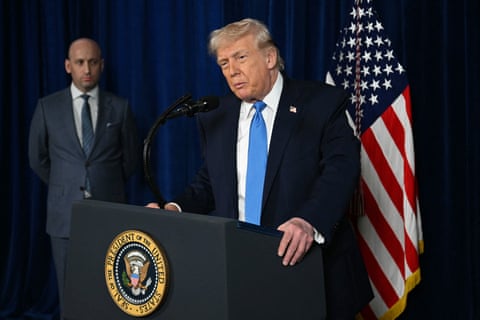
Donald Trump appeared in Davos with a bazooka of insults. He mocked Emmanuel Macron’s aviator sunglasses, chastised Mark Carney (“Canada lives off the United States”), claimed that the Swiss “are only good because of us” and criticised Denmark for losing Greenland “in six hours” during World War II.
But beyond the confrontational rhetoric, the US president delivered a deeper message on Wednesday that sought to unite the West rather than divide it. It was his darkest, most insidious and sinister project yet.
Trump assumed: Yes, we may have internal quarrels, but I bring tough love, because we are all in the same boat. We are the standard-bearers of Western civilisation. We must resist the barbarian hordes. We must save the white man.
The ageing president, who in 2024 complained that “we have a lot of bad genes in our country right now,” told the World Economic Forum that he is “of European descent,” namely: “100% Scottish, my mother; 100% German, my father. And we believe deeply in the bonds we share with Europe as a civilisation.”
He lamented that “certain places in Europe are no longer recognisable, frankly,” blaming factors such as “massive uncontrolled migration.” Trump said, “It’s horrible what they’re doing to themselves. They’re destroying themselves, these beautiful, beautiful places. We want strong allies, not severely weakened allies.”
What followed was pure racism, as Trump reflected on immigration in his own country, where he has made the Somali community a special target of his deportation rhetoric following recent cases of government fraud in Minnesota, in which most of the defendants were of Somali origin.
“We are fighting against a fraud of over $19 billion, which was stolen by Somali bandits,” he said. “Can you believe that Somalis have a higher IQ than we thought? I always say that these are people with low IQs. How did they get to Minnesota and steal all this money?”
Then he got to the heart of the matter: “The situation in Minnesota reminds us that the West cannot import foreign cultures en masse that have failed to build a successful society. I mean, we’re taking people from Somalia, and Somalia is a failed state — it’s not a nation. It has no government, no police, nothing.” (In fact, Somalia does have a government, although it is not democratically elected.)
He launched a fierce tirade against Ilhan Omar, a Democratic congresswoman of Somali origin who is an American citizen. Then he insisted: “The explosion of prosperity, achievement and progress that built the West did not come from our tax codes. Ultimately, it came from our very special culture.
This is the precious heritage that America and Europe share, and we share it. We share it, but we must keep it strong. We must become stronger, more successful and more prosperous than ever before. We must defend this culture and rediscover the spirit that lifted the West from the depths of the Middle Ages to the pinnacle of human achievement.”
Trump’s speech bore the mark of Stephen Miller, deputy chief of staff at the White House and architect of his draconian immigration policy. The speech was consistent with the whole discourse of white identity politics that is spreading on the American right.
It is found in the theory of the “great replacement,” a conspiracy notion that demographic changes are orchestrated to replace white majorities with non-white populations, undermining traditional culture. It is found in Trump’s decision to grant asylum to white South Africans because of a fictitious “white genocide” that is said to be taking place in their country. It is found in the fanatical ideology behind the Immigration and Customs Enforcement (ICE) raid on immigrants in Minneapolis.
It is also found in Miller’s worldview, which has long promoted racist fears about the demographic replacement of whites and the decline of civilisation. He has become the editor who turns Trump’s barroom talk into “Make America Great Again” scripture.
Speaking at the funeral of right-wing activist Charlie Kirk last year, Miller said: “Our lineage and heritage stretch back to Athens, Rome, Philadelphia and Monticello. Our ancestors built the cities. They created the art and architecture. They built the industry. We uphold what is good, virtuous and noble.”
Only Miller could spend last Christmas watching a 1967 family TV show featuring Dean Martin and Frank Sinatra and draw the following conclusion: “Imagine watching this and thinking America needs an infinite number of Third World immigrants,” he tweeted. (There was an immediate backlash from X users, who pointed out that both Martin and Sinatra were the sons of immigrants.)
Elon Musk, a white man born during apartheid in South Africa and now the richest person in the world, has amplified such ideas. His feed on X, the social media platform he owns, is still full of dire warnings about besieged white civilisation. Earlier this month, he retweeted with a “100%” endorsement a post that declared: “If white men become a minority, we will be slaughtered … White solidarity is the only way to survive.”
Trump’s far-right allies have recently become concerned that he has become distracted by global conquests — Iran, Venezuela, Greenland — and has lost sight of his “America first” creed. On Wednesday, he may have addressed the wealthy elites in Davos, but as always, his real target audience was back home. The message: I am still the great white hope.
Trump news in brief: in Davos, the president rambles, backtracks and promotes the “future agreement” on Greenland.
Trump told Davos attendees that the US would not use military force to conquer Greenland, but called for “immediate negotiations” – Wednesday, 21 January’s important US political news in brief
The Guardian team
Thursday 22 January 2026, 03:00 CET
It was a pretty eventful day in Davos.
Donald Trump began his participation in the World Economic Forum on Wednesday with a confusing and racist-tinged speech in which he attacked European leaders and reaffirmed his demand to purchase Greenland. But a few hours later, the US president backtracked and softened his threats to impose tariffs on several allied nations, claiming he had reached “the framework of a future deal” on US involvement in Danish territory.
The threat sparked widespread concern, criticism from senior European politicians, who said they would “not be blackmailed,” and warnings from economists.
Trump mentioned a “very productive” meeting with NATO Secretary General Mark Rutte, but did not provide many details about the “agreement” he presented as a victory for the US and its interests.
In an interview with CNBC on the same day, Trump said the agreement would include NATO’s involvement in his missile defence system, known as the “Golden Dome,” as well as “mineral rights” for the US.
Although official details have not yet been disclosed, the New York Times, citing anonymous senior officials, reported that military officers from member states of the transatlantic alliance had discussed a compromise whereby the US would gain sovereignty over small portions of Greenland.
What do Denmark and Greenland think about this? Some MPs have dismissed Trump’s story.
In an interview with Sky News on Wednesday, Danish MP Sascha Faxe said that “there can be no agreement without Greenland being part of the negotiations”.
“So there are no real negotiations,” Faxe added. “There are two men who had a conversation.”
Trump drops threat of tariffs on Greenland, citing vague “agreement” on territory
The US will not impose 10% tariffs on Denmark, Norway, Sweden, France, Germany, the United Kingdom, the Netherlands and Finland from 1 February, Trump wrote on his social media platform Truth Social.
Trump’s recent obsession with Greenland, after the US overthrew Nicolás Maduro’s regime in Venezuela, has unsettled officials around the world in recent weeks. Trump claims that Denmark owes Greenland to the United States for helping to defend the territory during World War II, which has been debunked, and that the United States needs the territory for national security reasons.
Doge inappropriately shared sensitive social security data
After months of denials, the Trump administration acknowledged in a federal court filing that employees working on Elon Musk’s alleged cost-cutting operation improperly accessed and shared sensitive social security data on Americans.
Netanyahu to join Trump’s ‘peace council’ despite previous objections
Israeli Prime Minister Benjamin Netanyahu said on Wednesday that he had agreed to join a US-backed “peace council” proposed by Donald Trump, despite his office’s previous criticism of the composition of its executive committee.
Pregnant woman in medical emergency deported from US, lawyer says
A 21-year-old woman, eight months pregnant and in a medical emergency, is being deported from Atlanta on Wednesday afternoon, a human rights lawyer said, requesting emergency assistance for his client.
“We are trying to get her the medical care she needs immediately,” said Anthony Enriquez, vice president of advocacy and litigation for the Kennedy Human Rights Centre in the US, whose client, Zharick Daniela Buitrago Ortiz, is about to be sent to Colombia.
Theranos founder Elizabeth Holmes asks Trump to commute her prison sentence
Theranos founder Elizabeth Holmes has asked Donald Trump to commute her sentence after she was convicted of defrauding investors in her now-defunct blood-testing start-up, which was once valued at $9 billion, according to an announcement posted on the US Department of Justice website.
ICE targets Somali communities in Maine as part of the Trump administration’s new crackdown
The Trump administration has launched a new crackdown on immigration, sending a large number of federal agents to Maine, an ocean fishing state, as part of a plan dubbed by the government as “Operation Catch of the Day.”
US Supreme Court appears sceptical of Trump’s attempt to dismiss Lisa Cook
US Supreme Court justices appeared sceptical of Donald Trump’s arguments for dismissing a Federal Reserve governor on Wednesday, in a key test of the president’s power – and his administration’s struggle to exert greater control over the US central bank.
US court allows ICE to arrest and use pepper spray against peaceful protesters in Minnesota
In a victory for the Trump administration, the US Eighth Circuit Court of Appeals on Wednesday approved the Justice Department’s request for an administrative stay of a preliminary injunction issued last Friday by Judge Katherine Menendez.
This order would have prohibited ICE agents from taking retaliatory action against peaceful protesters, arresting or detaining individuals participating in peaceful protests, using pepper spray or similar non-lethal ammunition and crowd dispersal tools, and stopping or detaining drivers without reasonable cause.
What else happened today:
An American judge on Wednesday temporarily blocked federal prosecutors from examining materials seized when the FBI searched the home of a Washington Post reporter.
A former employee of the Department of Homeland Security, who was fired after circulating a video criticising the agency’s head, Kristi Noem, sued the department, claiming that his dismissal violated his First Amendment rights.
The California Republican Party has asked the US Supreme Court to block a redistricting measure approved by voters in November that would have shifted up to five seats in the House of Representatives to the Democrats.
Speaking of redistricting, New York must redraw its congressional map, a state judge ruled on Wednesday, giving Democrats another key opportunity to gain another seat in the House of Representatives ahead of this fall’s midterm elections.
California Governor Gavin Newsom’s office said his participation in the World Economic Forum in Davos had been cancelled under pressure from the Trump administration.
Republican representatives in the House of Representatives advanced a resolution on Wednesday to accuse former President Bill Clinton and former Secretary of State Hillary Clinton of defying Congress in connection with the Jeffrey Epstein investigation, opening the prospect that the House of Representatives could apply one of the most powerful sanctions against a former president for the first time.
A massive winter storm will hit much of the US starting Friday, bringing snow, ice and extreme cold over nearly 2,000 miles, from the southwest to the east coast, affecting more than 200 million people.
Mexican President Claudia Sheinbaum defended the recent transfer of 37 members of the Mexican cartel to the US as a “sovereign decision,” as her government struggles to ease pressure from the Trump administration to take tougher action against drug trafficking groups.
Ukraine war update: Zelenskyy expected in Davos to meet Trump
It is unclear whether the presidents will have anything to sign; Mark Rutte urges NATO to provide its air defence stocks to Ukraine. What we know on day 1,429
Warren Murray and agents
Thursday, 22 January 2026, 03:06 CET
- Voldymyr Zelenskyy was announced on Wednesday evening to be heading to Davos after Donald Trump appeared to have summoned him to the World Economic Forum. The Ukrainian president had said a day earlier that he did not expect to attend the conference in Switzerland because Russian attacks had plunged Ukraine into an energy crisis: “Without a doubt, in this case I choose Ukraine rather than the economic forum, but everything can change at any moment.”
- Trump’s announcement of the meeting appeared to be made at the last minute, as he said it would take place on Wednesday, when his Ukrainian counterpart was not even in the same country. After Trump’s statement, officials clarified that the meeting would take place on Thursday. Zelenskyy previously stated: “Meetings with America should always end with concrete results to strengthen Ukraine or bring us closer to the end of the war. And if the documents are ready, we will meet.” Discussions between senior Ukrainian officials and Trump’s emissaries have continued since Saturday, including in Davos, but on Wednesday evening it was unclear whether there would be any documents to sign.
- Senior Ukrainian negotiator Rustem Umerov said he had met with US representatives Steve Witkoff and Jared Kushner in Davos. Umerov repeated the familiar refrain that their talks focused on security guarantees and post-war recovery. Umerov said a Ukrainian delegation also met with representatives of the American investment firm Blackrock to discuss reconstruction plans.
Russian President Vladimir Putin said he would meet with Witkoff and Kushner on Thursday as they travelled from Davos to Moscow. Interestingly, Putin, quoted by Russian news agencies, said he would discuss with US representatives the possible use of frozen Russian assets. The EU has been arguing over how to mobilise Russian assets held by Belgium, worth around €300 billion ($350 billion), to help Ukraine defend itself and rebuild. Putin appeared to be trying to thwart European efforts, saying, according to sources, that he wanted to use the funds to restore “territories affected during military actions.” He did not specify whether these would be Ukrainian, Russian or Russian-controlled areas.
NATO Secretary General Mark Rutte on Wednesday urged military chiefs to press their national governments to provide Ukraine with the air defence systems it urgently needs. “Please use your influence to help political leaders do even more,” Rutte said in a video message to senior military officials gathered at NATO headquarters in Brussels. “Look into your stocks to see what else you can offer Ukraine, especially air defence interceptors. Now is the time.”
A Ukrainian drone attack set fire to oil terminal tanks in Volna, in the southern Krasnodar region, on Wednesday, Russian authorities said, claiming that three people were killed and eight wounded. There were accusations and counter-accusations after a fire at residential buildings near the city of Krasnodar in southwestern Russia. The region’s leader said it was an attack by Ukrainian drones and that 11 people were injured. The Ukrainian side claimed it was stray fire from Russian air defences. Andriy Kovalenko, head of Ukraine’s disinformation centre : “A Russian air defence missile hit a residential building in the town of Afipsky [in the Adygea region].”
Starmer toughens his rhetoric towards Trump and condemns pressure on Greenland
The Prime Minister also accuses Kemi Badenoch of supporting the American president’s efforts to “undermine the government’s position.”
Peter Walker and Alexandra Topping
Wednesday, 21 January 2026, 18:59 CET
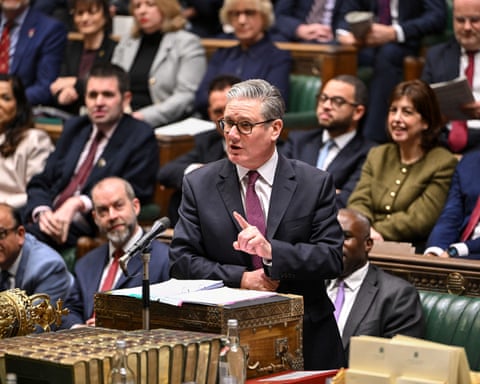
Keir Starmer has noticeably toughened his rhetoric towards Donald Trump, telling the House of Commons that the US president’s condemnation of the Chagos Islands agreement with Mauritius was intended to weaken the UK’s resolve on Greenland.
In a sometimes heated exchange with Kemi Badenoch during Prime Minister’s Questions, Starmer denounced the Conservative leader’s use of Trump’s words to reject the Chagos agreement, saying the president was not sincere in his objections.
“President Trump used words yesterday about Chagos that were different from his previous words of welcome and support,” he said, adding that the American leader used them “for the express purpose of putting pressure on me and the United Kingdom regarding my values and principles, regarding the future of Greenland.
“He wants me to back down from my position, and I have no intention of doing so. Given that this was his express purpose, I am surprised that the opposition leader has joined the movement.”
Starmer had already condemned Trump’s threat this week to impose increasing trade tariffs on eight European countries that have sent troops to Greenland, including the UK, if they refused his demand that the US take control of the vast island, which is a largely autonomous part of Denmark.
He said reciprocal tariffs or other direct retaliation against the US would be a mistake, but his language on Wednesday was much tougher on a president he has generally tried to flatter or persuade rather than provoke.
Badenoch and the leaders of all the other main parties in Britain have expressed their opposition to any US plans for Greenland without the will of its people, but Starmer argued that the Conservative leader’s adoption of Trump’s comments on the Chagos Islands undermined that position.
Speaking at the World Economic Forum in Davos on Wednesday, Nigel Farage reiterated that Greenland’s sovereignty must be respected, while arguing that the world would be safer if the US took control of the territory.
The Reform UK leader said: “I have no doubt that the world would be a better and safer place if a strong America were present in Greenland, because of the geopolitics of the far north, because of the melting ice caps and because of the continuing expansionism of Russian icebreakers and Chinese investment.
“So, yes, would it be better for the world in terms of security and stronger for NATO if America owned Greenland? Yes, it would. However, if you believe in Brexit and if you believe in celebrating America’s 250th anniversary, if you believe in nation states and not globalist structures, you believe in sovereignty.
“And if you believe in sovereignty, you believe in the principle of national self-determination.”
In a post on his Truth Social platform on Tuesday night, Trump reversed the US’s previous support for the agreement to transfer sovereignty of the Chagos Islands to Mauritius, a plan designed to secure the future of the important British-American air base on Diego Garcia, the largest island in the Indian Ocean archipelago.
“Shockingly, our ‘brilliant’ NATO ally, the United Kingdom, is now planning to give away the island of Diego Garcia, home to a vital American military base, to Mauritius, and to do so for NO REASON,” he wrote, amid an avalanche of posts about Greenland.
“The UK’s surrender of an extremely important territory is an act of GREAT STUPIDITY and represents another reason in the long list of national security reasons why Greenland must be acquired.”
After Badenoch asked Starmer about Trump’s position, the prime minister said it undermined political unity on Greenland.
“I understood that her position was to support the government’s position on the future of Greenland,” he said. “Now she seems to be supporting President Trump’s words to undermine the government’s position on the future of Greenland. She has chosen pure opportunism over the national interest.”
After Badenoch argued that this was not the case, Starmer reiterated that Trump’s statements on the Chagos Islands “were expressly intended to pressure me to abandon my principles” on Greenland.
“What he said about Chagos was literally in the same sentence as what he said about Greenland,” he said. “That was his purpose, and the future of Greenland is a binary issue that is dividing the world at the moment, with material consequences.”
Starmer, emboldened, changes tactics as soft approach fails to sway Trump
Pippa CrerarPolitical Editor
Prime Minister surprisingly firm at PMQs over US president’s change of position on Chagos and refusal to drop threat of tariffs on Greenland
Wednesday, 21 January 2026, 16:28 CET
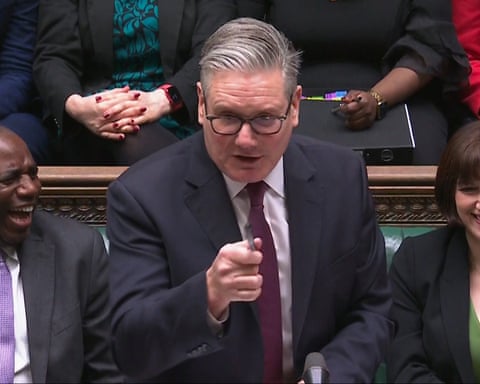
For a man who chooses his words so carefully, there is no doubt that Keir Starmer’s change of tone towards Donald Trump in Prime Minister’s Questions was deliberate.
Since the beginning of the year, as the US president has shown his imperial ambitions, the prime minister’s gentle approach to his unpredictable friend in the White House has come under increasing pressure.
His delicate position – diplomacy in private and building a close relationship in the hope of greater influence – exploded spectacularly on Saturday when Trump threatened to impose 25% tariffs on European allies who oppose the US takeover of Greenland.
Within hours, Starmer responded: “Imposing tariffs on allies because they pursue the collective security of NATO allies is completely wrong.” Apart from disagreeing with Trump over his claim that London wanted to implement Sharia law, this is the first time the prime minister has criticised him so vehemently.
On Monday, at a hastily organised press conference at Downing Street, Starmer insisted that he still hoped to find a “pragmatic, sensible and sustainable” way out of the latest crisis – and that he would prefer “calm discussions” to “political gestures” that could damage transatlantic relations.
However, his message became even tougher: that US tariffs would damage the British economy and were “in no one’s interest” – while maintaining (almost) the threat of retaliatory tariffs. It was not quite the calming down that his most vehement critics claim.
Donald Trump said the UK’s agreement to return the Chagos Islands to Mauritius was an “act of great stupidity”. Photo: Gian Ehrenzeller/AP
“Keir usually has a very English attitude to all these things: polite, civilised, direct, without any dramatic tendencies. In the context of all this, he was actually very firm, and this will be noted in Washington,” a cabinet minister observed shortly afterwards.
“There may come a time when Keir will have to decide that we need a more obvious change in both rhetoric and substance. But for now, he has to try to follow his path.”
That more obvious change seems to have come sooner than many expected. On Wednesday, in the House of Commons, in response to questions from Conservative Party leader Kemi Badenoch about Trump’s change of heart on Chagos, the prime minister insisted he would not budge on his position on Greenland.
“President Trump used different words yesterday than he had previously used to welcome and support Chagos. He used those words for the express purpose of putting pressure on me and the UK,” he said.
“He wants me to give up my position, but I will not… I will not give in. The UK will not give up our principles and values on the future of Greenland and threats of tariffs.”
It appears that Starmer considers Trump’s threats against the United Kingdom, a country with which the US has collaborated so closely – including helping to capture a Russian-flagged oil tanker earlier this month – to be completely unacceptable.
His courage has been strengthened, say inside sources, by Trump’s sudden change of attitude towards the Chagos agreement and what he sees as the opportunism of Badenoch and the Conservatives on this issue, given that he believes that, as leader of the opposition, he has always put the national interest above politics.
Some Labour Party members seemed surprised to hear their usually diplomatic leader speak so firmly. However, there are also people in the country who would like him to go even further.
Among them is Liberal Democrat leader Ed Davey, who wrote in The Guardian: “Starmer now faces a choice: to continue his failed strategy of sucking up to Trump or to stand up to him, as we would any other bully. Bullies don’t stop when asked: they stop when they are forced to.”
For now, Starmer’s criticism of Trump is specific and limited. But watch this space: if the US president becomes more threatening, more aggressive, then the prime minister’s response – though still carefully considered – will likely be more measured.
Are middle powers banding together? Trump’s chaos sparks talk of new liberal alliances
Patrick WintourDiplomatic Editor
As Mark Carney, Emmanuel Macron and Ursula von der Leyen decide to “live in truth”, what will it take for Starmer to criticise Trump?
Wednesday, 21 January 2026, 18:09 CET
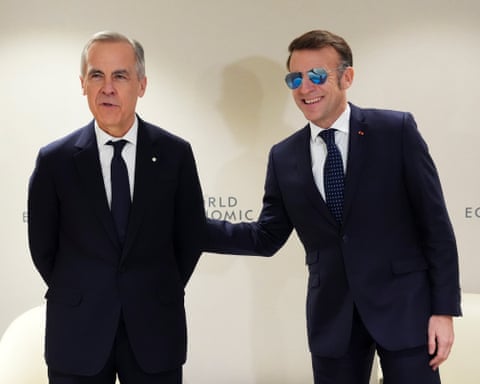
Donald Trump declared at the Davos economic forum that “without us, most countries wouldn’t even function,” but for the first time in decades, many Western leaders have come to the opposite conclusion: they will function better without the US.
Individually and collectively, they have decided to “live in truth” — an expression used by Czech dissident Vaclav Havel and mentioned by Canadian Prime Minister Mark Carney in his highly acclaimed speech on Tuesday in Davos. They will no longer pretend that the US is a reliable ally or even that the old Western alliance still exists.
Donald Trump half-retracted his threat to invade Greenland in a rambling and incoherent speech at Davos. Photo: Laurent Gilliéron/Reuters
Trump’s threat to invade Greenland – half-retracted in his confusing and incoherent speech on Wednesday in Davos – and his glorification of using tariffs to intimidate allies were the last straw. Thus, on the first anniversary of his second term, the taboos surrounding the denial of his role as “leader of the free world” seem to have been broken.
Just as the greengrocer in Havel’s story took down the poster in his shop window praising the communist empire and began to tell the truth about the falsehood he had been living, so the leaders of some liberal Western middle powers seem determined to abandon the collective lie about the continuing value of partnership with the US. Whether this collective discovery of backbone is more than rhetoric, time will tell.
Carney, perhaps the most eloquent of those who have voiced this sentiment, vowed that he would no longer live in a state of nostalgia, waiting for the return of the old world. This is a rupture, not a transition, he said. Without ever mentioning the US, he marked “the end of a pleasant fiction and the beginning of a brutal reality in which the geopolitics of great powers are subject to no constraints”.
The former governor of the Bank of England was not alone in diagnosing that the old order based on deeply flawed rules had been trampled by Trump. Speaking to the European Parliament on Wednesday, European Commission President Ursula von der Leyen said: “We now live in a world defined by raw power, be it economic or military, technological or geopolitical. In an increasingly lawless world, Europe needs its own levers of power.”
French President Emmanuel Macron, repeatedly disparaged and mocked by Trump this week, was extremely candid: the world is moving towards a “rule-free” system in which imperialist ambitions weigh heavily on multilateralism; international bodies that once served to resolve problems are weakened, even abandoned; The US is “openly trying to weaken and subordinate Europe,” he said.
Finnish President Alexander Stubb, author of the book “The Power Triangle: Rebalancing the New World Order,” argued that liberal Europe is under double pressure from the US because Washington no longer considers Europe important in the hierarchy of American interests and because it is seen as an ideological enemy that has awakened.
Stubb said: “The people around Trump in the Maga movement see themselves as leaders of a great change, just as Ronald Reagan and Margaret Thatcher did after the collapse of the Keynesian consensus.
They are leading a movement against liberalism, globalisation and interdependence.”
The leader most reluctant to join this public confession was the pragmatic dogmatist Keir Starmer. Without mentioning Britain, Carney sent a message to Starmer about the flaws in his position. “When we negotiate only bilaterally with a hegemonic power,” he said, “we negotiate from a position of weakness.” This is not sovereignty, he added, and the only option for “intermediate” countries was to compete with each other for favours or to unite “to create a third way with impact.”
It is noteworthy that Ed Miliband, the British secretary of state for energy, praised Carney’s speech, saying that “the situation has changed” between Starmer and the US. His remarks reflect the growing division within the Labour Party leadership over the need not only to express differences with Trump, but also to join others in challenging the entire ideology.
Mark Carney sent a message to Keir Starmer about the flaws in the “middle ground” position. Photo: Arnd Wiegmann/Reuters
Tied to the US because of the nuclear and security relationship, British diplomats saw only the downsides of a break with their indispensable ally. But over the past year, Starmer has begun to see the advantages of investing in a network of alliances among middle powers to counter the giants of China, Russia and the US.
Starmer’s allies say the most obvious path forward is to work with Macron to restart stalled negotiations on a closer defence alliance with Europe, including access to the European defence industry. These negotiations have stalled because of the high entry fee to this market demanded by the EU.
So many European powers now share a common diagnosis that US value-based realism requires Europe and the UK to work more closely together than ever before.
This requires accepting the world as it is, not as we would like it to be, one of Stubb’s favourite phrases. It means trying, if possible, to find points of agreement with the US on Greenland, through a possible permanent NATO presence ( ), and on Ukraine, through security guarantees. What can be saved from this relationship must be saved.
It does not mean offending without reason, but rather, like Havel’s greengrocer, “calling reality by its name”. As Carney advised his fellow leaders: “When middle powers criticise economic intimidation from one direction but remain silent when it comes from another, we keep the sign in the window.”
For Starmer, this would be a radical change, breaking with 80 years of foreign policy. Trump may have left him no other option.
Trump says Canada should be grateful for the “gifts” it receives from the US
The US president criticises Mark Carney a day after the prime minister warned that the world is facing a geopolitical “rupture”
- Trump news in brief: in Davos, the president rambles, backtracks and promotes the “future deal” on Greenland
Leyland Cecco in Toronto
Wednesday, 21 January 2026, 21:00 CET
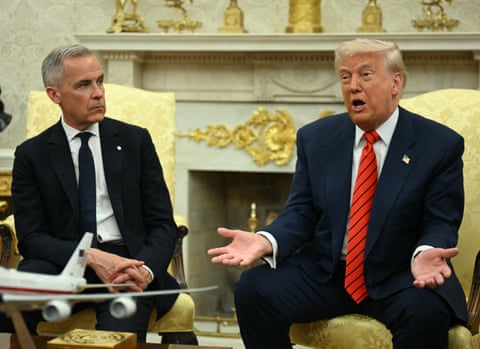
Donald Trump said Canada should be “grateful” for the “gifts” it receives from the US, a day after its prime minister, Mark Carney, warned that the world is facing a geopolitical “rupture.”
Addressing participants at the annual meeting of the World Economic Forum in Switzerland, the US president highlighted Carney’s speech, which harshly criticised US foreign policy.
“Canada gets a lot of gifts from us, by the way. It should be grateful, but it’s not. I watched your prime minister yesterday. He wasn’t very grateful,” Trump told th . “Canada lives because of the United States. Keep that in mind, Mark, the next time you make statements.”
In his rambling and irritated speech, Trump repeated his intention to take control of Greenland to build the Golden Dome missile defence system, which Canada hopes to join. Trump said the Golden Dome “will defend Canada.”
The Prime Minister’s Office said it had no intention of commenting on Trump’s remark, adding that there were no plans for a meeting between the two leaders.
Trump’s attacks on Carney came a day after a closely watched speech in which the prime minister lamented the erosion of international institutions and called for new global measures to combat the rise of “hegemons” who overturn global norms.
“Middle powers must act together, because if you’re not at the table, you’re on the menu. The big powers can afford to act alone. They have the market size, the military capacity, the leverage to dictate terms,” Carney said. “Middle powers don’t.”
Without naming Trump, Carney said the “old order” of alliances and rules-based order would not return. “We shouldn’t mourn it,” he said. “Nostalgia is not a strategy.”
Trump has used his second term to extract concessions from allied nations in negotiating trade deals and has increasingly questioned the value Canada has to their relationship.
During a visit to a car factory in Michigan in mid-January, Trump said his country “doesn’t need” products from Canada, adding that the USMCA free trade agreement between the two countries and Mexico — which he renegotiated during his first term — was “irrelevant” to him.
Canada is increasingly seeking new trade agreements to reduce its dependence on the US.
“When we talk about Americans, they will always be important to Canada. Our geography is not going to change,” Canadian International Trade Minister Maninder Sidhu told reporters in Davos. “But if we look at who else we want to do business with: China is our second-largest trading partner. India will become the third largest economy. We are looking for opportunities around the world.”
Ontario Premier Doug Ford, who oversees the country’s largest provincial economy, said the US president’s remark in Davos was “disappointing” but “typical” of Trump.
“In recent days, we have seen President Trump threaten Greenland, threaten Canada and threaten NATO allies,” Ford said. “President Trump remains relentless in his campaign to create a more unstable, more uncertain and more uncertain world.
There has never been a more important time for Team Canada to stand united.”
Ford also referred to a post by Trump on social media, which contained a modified image in which the US flag covered Canada, Greenland and Venezuela.
“It’s disappointing to see him attacking with such force,” Ford said. “Putting the American flag over Canada, over Greenland, is unacceptable.”
Keir Starmer will visit China with British business leaders next week, according to reports
The prime minister’s trip comes after the British government approved the construction of a new Chinese embassy in London
Ben Quinn and Dan Sabbagh
Wednesday, 21 January 2026, 11:09 CET
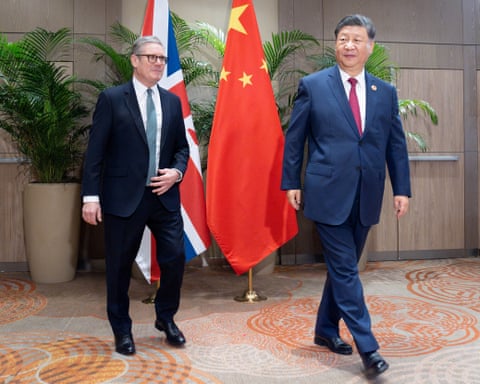
Keir Starmer will visit China next week after his government approved Beijing’s controversial plans to build a vast embassy in London.
The British Prime Minister will lead a delegation of leading British companies, according to Reuters. The same firms, which include BP, HSBC, Intercontinental Hotels Group, Jaguar Land Rover and Rolls-Royce, are also said to be among those that will join a revamped “UK-China CEO Council”.
On Wednesday morning, Downing Street had no comment. However, Jonathan Powell, the national security adviser, travelled to Beijing in November for talks with China’s senior diplomat, Wang Yi, ahead of Starmer’s anticipated visit.
These developments come amid turmoil over the resumption of relations with China, including last year’s scandal over the dropping of charges against two men accused of spying for Beijing.
The way for Starmer’s visit was also paved last week when British Communities Secretary Steve Reed gave China permission to build its new embassy near the Tower of London after intelligence chiefs told him that the risks to UK national security could be controlled and managed.
However, residents in the Royal Mint Court area have raised the £145,000 needed to pay for lawyers to challenge the planning decision. They are expected to file a judicial review application within the next six weeks, most likely arguing that Reed has already made a decision without properly considering all the evidence.
A spokesperson for China’s Foreign Ministry said on Wednesday that Beijing had handled the planning of a new British embassy in full compliance with international diplomatic practices and relevant laws and regulations. Providing support and constructing diplomatic premises is an international obligation of the host country, Guo Jiakun told reporters at a regular press conference.
Britain’s delicate approach to relations with China also comes amid the ongoing diplomatic crisis in Greenland. US President Donald Trump has said the territory should become American to protect against a security threat in the Arctic from China and Russia.
The UK-China Executive Board was originally conceived by Theresa May, then British Prime Minister, and Li Keqiang, then Chinese Premier, in 2018, during a period of relations that May and others described as a “golden era.”
The Chinese side should be represented by the Bank of China, China Construction Bank, China Mobile, Industrial and Commercial Bank of China and others, Reuters reported.
The last British prime minister to visit China was May in 2018. Rachel Reeves, the chancellor, travelled to China with a business delegation in January and unveiled a £600 million investment. Ed Miliband, the energy secretary, and Peter Kyle, the trade secretary, also visited China for talks in the last year. During the same period, senior Chinese government officials made several visits to the UK.
Netanyahu joins Trump’s “peace council” despite previous objections
The Israeli prime minister accepts a role in the US-proposed body, with initial responsibilities for overseeing the ceasefire in Gaza
Lorenzo Tondo in Jerusalem
Wednesday, 21 January 2026, 12:06 CET
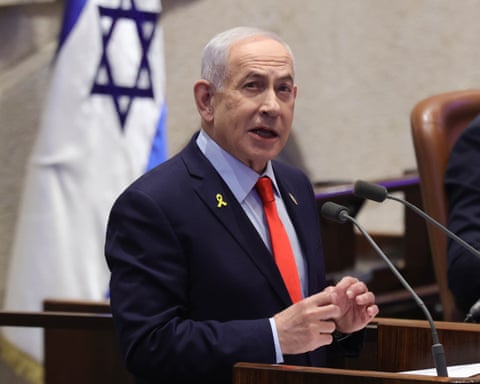
Israeli Prime Minister Benjamin Netanyahu said on Wednesday that he had agreed to join the US-backed “peace council” proposed by Donald Trump, despite his office’s previous criticism of the composition of its executive committee.
The body, chaired by the US president, was initially presented as a limited forum of world leaders tasked with overseeing the ceasefire in Gaza. More recently, however, the initiative appears to have expanded far beyond this mandate, with the Trump camp inviting dozens of countries and suggesting that the council could evolve into an instrument for mediating conflicts beyond the Middle East.
Diplomats have warned that the council could undermine the work of the UN.
When asked by a reporter on Tuesday whether the council should replace the UN, Trump replied, “It could.”
He said the global body “hasn’t been very useful” and “has never reached its potential,” but added that the UN should continue “because its potential is very great.”
Netanyahu’s office had previously opposed the composition of the council’s executive committee, which includes Turkey, a regional rival of Israel. In a brief statement, it said the committee had been formed without coordination with the Israeli government and was “contrary to its policy,” without providing further details.
Far-right members of Israel’s governing coalition on Sunday rejected the US-backed plan for post-war governance in Gaza, criticising Netanyahu for not annexing Palestinian territory and establishing new Israeli settlements there.
However, on Sunday, Netanyahu’s office announced that he had accepted the US president’s invitation.
Countries that have already agreed to participate include the United Arab Emirates, Morocco, Vietnam, Belarus, Hungary, Kazakhstan and Argentina. Other countries, including Britain, Russia and the EU’s executive arm, have confirmed they have received invitations but have not yet responded.
Cardinal Pietro Parolin, the Vatican’s top diplomat, said on Wednesday that Pope Leo had also received an invitation. “I think it will be something that requires a little time for reflection before giving an answer,” he told reporters.
A statement from the Norwegian prime minister’s office announced that Norway would not be joining the council, saying the proposal “raises a number of questions that require further dialogue with the United States […] Norway will therefore not be joining the proposed arrangements.”
A draft charter sent to about 60 countries by the US administration asks members to contribute $1 billion in cash if they want their membership to last more than three years, according to a document seen by Reuters.
Diplomats warned that the proposed “peace council” appears to target existing international institutions, including the UN. The charter council states that the committee must have “the courage to move away from approaches and institutions that have too often failed.”
Trump has long criticised the UN and earlier this month announced that the US would withdraw from 66 international organisations and treaties, about half of which are affiliated with the UN system.
According to the draft charter, membership of the council would be limited to states invited by the president. The president would also be granted extensive powers, including the authority to exclude member states — subject to a two-thirds veto by the council — and to appoint a successor in the event of his departure.
The Associated Press contributed to this report.
NATO’s revised maritime strategy and North Sea security
In October 2025, the North Atlantic Treaty Organisation (NATO) published its revised Maritime Strategy, a policy statement intended to deter adversaries while reassuring allied nations and their publics. Inevitably, commentators have focused on the contribution of the alliance’s maritime elements to deterring and defending member states’ interests in the event of a major conflict between equals. From continuous nuclear deterrence at sea (CASD) to conventional forces that rely on the unique attributes of maritime forces, the revised Maritime Strategy is clear: NATO’s sea-based forces are “always on guard – ready to fight.”
Russia is given priority as the source of maritime threats facing NATO. In addition, terrorism and international criminal organisations that use the maritime environment for profit are highlighted. The People’s Republic of China (PRC), although a more distant threat due to its position in the Indo-Pacific, is also present in the strategy.
The strategy’s emphasis on non-traditional, below-the-threshold security threats is significant, with references to them throughout the document. Destabilising and disruptive actions targeting the infrastructure of free and open countries, along with drug and arms trafficking and human smuggling, are highlighted – as is the ‘shadow fleet’ operated by states evading sanctions.
The significance of North Sea security
The North Sea has served for centuries as a vital means of communication and trade. Today, it is a crucial source of energy – and, implicitly, prosperity – for the citizens of Western Europe through its vast oil and gas reserves. While these remain essential sources of energy, the North Sea is strategically important to Europe’s energy future and transition to sustainability. It is home to some of the world’s largest offshore wind farms, which in turn offer potential for hydrogen production, and the local geology offers potential for offshore carbon storage.
For communities around the North Sea, energy production has generated tens of thousands of jobs in technology, engineering and construction – as many onshore as offshore. In an increasingly volatile era, the energy supplied by the North Sea region is essential to the security of European society.
Both now and in the future, the North Sea energy system relies on complex integrated systems. Oil and gas platforms, offshore wind turbines and internet communications require a wide range of subsea cables and pipelines, offshore nodes and landing sites. As shown in Box 1, this is nowhere more evident than in the Humber Estuary:
Box 1: Case study of the Humber Estuary
Located in the centre of the UK’s North Sea coastline, the Humber Estuary is the largest port complex in the UK and a hub for maritime communications in the North Sea. It has a vibrant and vital offshore renewable energy industry, which has led to it being known as the UK’s ‘Energy Estuary’. It is home to oil and storage terminals, ferries and freight transport, as well as landing centres for submarine cables and pipelines connected to the North Sea energy network.
In total, 25% of the UK’s energy needs pass through the Humber region each year. The Drax power station, located near Selby, is the UK’s largest power station and source of renewable energy, generating 5% of the UK’s energy and 10% of the UK’s renewable energy. Without the port at Immingham, however, it could not operate.
The Humber Estuary also provides access to ports deeper inland than any other river in the UK. At the heart of the vast estuary complex lies Kingston-upon-Hull, a city with a rich maritime history. The University of Hull shares this history and today adds to it with its ambition to create a fairer, brighter and carbon-neutral future for all through maritime security and sustainable energy.
In addition to being transit points for goods and people, North Sea ports provide support vessels for this maritime infrastructure. However, these ports and critical energy infrastructure are extremely vulnerable to disruption by the UK’s adversaries.
The sub-threshold threat
Through its Main Directorate for Deep Sea Research (GUGI), Russia has one of the most sophisticated deep-sea operations, enabling continuous and persistent activities in and around the North Sea. Dedicated to covert deep-sea intelligence gathering and sabotage, GUGI has excellent technological capabilities, particularly in deep-sea submersibles, as well as a capable range of surface support vessels. However, it is not the only – nor probably the main – threat to offshore infrastructure.
In recent years, sub-threshold attacks on offshore infrastructure have increased across Europe. Perhaps most notable is the damage to the Nord Stream 1 and 2 pipelines in September 2022. However, the Baltic Sea in particular has been subject to several other disruptive attacks, including on the Balticconnector pipeline in October 2023; the BCS interconnector between Sweden and Lithuania and C-Lion1 between Finland and Germany in November 2024; the Estlink 2 cable between Finland and Estonia in December 2024; and the TV and radio cable off the coast of Gotland in January 2025.
In addition, in February 2025, new damage to the C-Lion link was discovered, and after the Boracay shadow fleet vessel was boarded by French forces in October 2025, there was a further twist with extensive drone activity leading to the closure of Danish airports. Despite these examples – and these are not exhaustive – the shadow fleet represents unrealised potential.
In none of the activities mentioned was there a proven suspect under any legal standard. Plausible deniability is essential for sub-threshold action.
There are thousands of ships in the shadow fleet operating under false flags, manipulating Automatic Identification Systems (AIS) through renaming and false registration. Theoretically designed to avoid sanctions – particularly in oil transport – they offer a wide range of other attributes, including the movement of illicit cargo such as drugs and weapons, as well as the movement of people, military or otherwise.
Russia operates the largest global shadow fleet, but it does not do so alone. It is suspected that most of the aforementioned disruptions were carried out by Chinese vessels, using a relationship in which Russian vessels act reciprocally for the PRC off the coast of Taiwan and elsewhere.
It is important to note that “suspected” is the key word here. In none of the activities mentioned was there a proven suspect according to any legal standard. Plausible deniability is essential for sub-threshold action.
NATO in the North Sea
At the launch of NATO’s revised Maritime Strategy, Safe Seas – a leading research network dedicated to maritime security and ocean governance – reported that the alliance had achieved the widest dissemination of the strategy among stakeholders in the maritime security community. It also noted that NATO is increasingly relying on industry-generated data.
This is significant. If the intelligence needed to attribute disruptive attacks is to be generated, an industry-wide approach is required. At the most basic level, intersubjective agreement is needed to establish what needs to be protected, how it should be protected, and by whom. Although commercial operators possess this information, intersubjective agreement is not always reached – as highlighted in a report by the Joint Committee on National Security Strategy.
Technology will be essential for generating information and data for offshore and underwater infrastructure. However, it is important to note that when considering surface activity around critical underwater infrastructure – as well as ports and critical land-based infrastructure – traditional human intelligence remains vital.
NATO’s ultimate goal behind such an approach is to achieve persistent maritime situational awareness; the basic requirement for any effective maritime security structure. In this regard, the alliance’s engagement with stakeholders should be contextualised with its actions elsewhere, such as the establishment of the Critical Submarine Infrastructure Coordination Cell at NATO headquarters in Belgium and the Centre for Critical Submarine Infrastructure at Allied Maritime Command (MARCOM) in the United Kingdom. Another important action is the development of the “Mainsail” project, which aims to cultivate persistent maritime situational awareness, vital for generating the necessary maritime information.
Technology will be essential for generating information and data for offshore and underwater infrastructure. However, it is important to note that when considering surface activity around critical underwater infrastructure – as well as ports and critical land-based infrastructure – traditional human intelligence remains vital. This also applies to threats posed by cross-border terrorist and criminal activities.
This is where a problem arises. Too often, personnel on the ground do not know what to look for and whom to inform when discrepancies arise. Large portions of ports and other facilities are open, with limited security. For security personnel and police tasked with protecting land-based infrastructure, creating secure and reliable networks for generating and processing information is vital to gathering the intelligence needed to deter and prevent disruptive attacks.
All of this requires an industry-wide approach to security and intelligence gathering. British policymakers cannot focus exclusively on offshore and underwater issues. Liminality is a key feature of maritime security issues; viewing maritime security as an isolated offshore issue is futile.
Dr Christopher Martin is Senior Lecturer in Contemporary War and Security Studies at the University of Hull’s School of Criminology, Politics and Law. He received the Julian Corbett Prize for Research in Modern Naval History in 2005, and his book The UK as a Medium Maritime Power in the 21st Century was shortlisted for the UK Maritime Foundation’s Mountbatten Prize in 2017.
This article is published in association with the University of Hull as part of the International Maritime Power 2025 Conference.
Source: here
A radical transformation of maritime autonomous surface vessels (MASS)
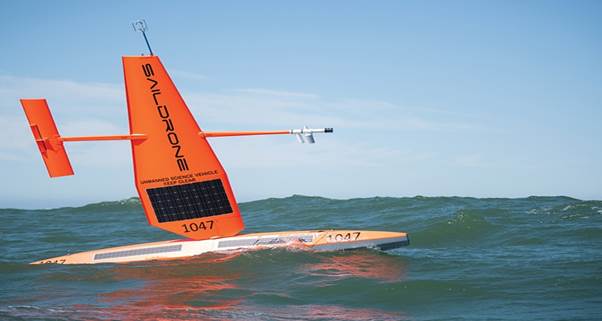
Credit: Saildrone
The rapid development of maritime autonomous surface vessels (MASS) is radically transforming the global maritime environment and affecting the viability of virtually every function on board a ship, from communications and navigation to speed and collision avoidance.
Fully autonomous ships use technological processes to control navigation, propulsion and other critical functions without the need for human intervention, while the ship’s automated systems can simply collect data about the ship’s surroundings and assist the human crew in making decisions.
In October 2021, the world’s first autonomous and remotely controlled voyage of a commercial ship at sea, covering over 1,000 nautical miles, was successfully completed. The Nellie Bly’s voyage covered 1,027 miles, 97% of which was under fully autonomous control using an AI-enabled SM300 autonomous vessel system developed by Sea Machines Robotics.
Approximately 31 collision avoidance and traffic separation manoeuvres were performed during the 13-day voyage — dubbed the Odyssey of the Machine — which began and ended in Hamburg, Germany, and ended in 129 operational hours spread over 13 days, constantly monitored by licensed mariners in Boston, approximately 3,000 miles away.
The following June, the LNG carrier Prism Courage arrived in South Korea after completing a 33-day, 12,500-mile transit from Freeport, Texas, using autonomous navigation, the first use of such technology.
The transoceanic voyage was supervised by the American Bureau of Shipping (ABS) and the Korea Register of Shipping (KR) and involved the use of navigation technology developed by HD Hyundai’s subsidiary, Avikus, for approximately half of the voyage.
The National Oceanic and Atmospheric Administration (NOAA) currently operates the world’s second-largest government research fleet, including a growing fleet of unmanned systems that support the agency’s core missions of nautical mapping, fisheries research, oceanography, and deep-sea exploration along the nation’s entire coastline. The agency has taken a proactive stance in integrating autonomous technologies into its operations.
Such unmanned systems “serve as force multipliers for NOAA, enhancing traditional data collection methods and allowing us to collect data in hard-to-reach or rarely explored regions,” says Lisa Nakamura, acting director of NOAA’s Unmanned Systems Operations Centre, adding that the agency uses unmanned systems “to increase the productivity, safety, and longevity of our research efforts.”
For example, the agency maintains a fleet of five autonomous “hurricane” drone ships that are deployed in the Atlantic Ocean during hurricane season, collecting data around the clock to help understand the physical processes of hurricanes and improve storm forecasting.
The vessels — Explorer SD 1045 — are the result of a partnership between NOAA and designer-developer Saildrone, based in Alameda, California.
In September 2021, in a first-time operation, one of the craft was directed into the middle of Hurricane Sam, a Category 4 hurricane. Battling 50-foot waves and winds over 120 mph, it successfully collected and transmitted critical scientific data and real-time video observations to NOAA research laboratories.
In addition, the US Coast Guard is moving forward with plans to integrate MASS technology into its operational strategies with the recent creation of a new Executive Office for Robotics and Autonomous Systems.
The office will serve as “a key component” of the Service’s Force Design 2028 plan and “is poised to be the most transformative capability enhancement since the dawn of aviation” with the primary mission of “accelerating the development, acquisition, implementation, and maintenance of robotic capabilities and autonomous systems throughout the Coast Guard,” according to Coast Guard Headquarters in Washington, D.C.
As MASS technologies evolve, their rapid development is somewhat slowed by the need for better-defined regulatory and operational parameters.
“Ensuring the safety of autonomous technologies in diverse and dynamic maritime environments remains the primary challenge,” says Michael Kei, vice president of technology at the American Bureau of Shipping.
Key concerns, he says, “include sensor performance and reliability in adverse weather conditions, cybersecurity resilience, and effective interactions between human and autonomous systems. The regulatory environment for operating unmanned systems, says Nakamura of NOAA, “is still developing, which can make operationalising systems difficult in a changing landscape.”
While DNV, the classification society, has compiled its new notations on Autonomous and Remotely Operated Ships to establish a framework for how self-remote ships can achieve equivalent or greater safety compared to conventional ships, the International Maritime Organisation (IMO) is currently developing a regulatory framework for autonomous ships in commercial operation in international waters.
Designed to address cross-cutting issues such as safety, training and legal responsibilities, the framework is generally expected to be adopted by member countries on a non-mandatory basis by the end of this year and to be made mandatory for member countries in 2032 through an amendment to an existing IMO convention.
As a starting point, the organisation has issued recommendations on which ships are best suited for fully autonomous operation, specifically proposing that AI-generated operational autonomous technology be used in the design of research vessels used for meteorological and scientific data collection; specialised vessels designed for disaster response, such as monitoring oil spills or extinguishing fires on board; small and medium-sized cargo carriers involved in river or inland waterway transit; and short-distance passenger ferries used on inland, river or coastal routes.
On a final note, the IMO said that all autonomous ships “should have a human in command either on board or in a remote location, or who can take control when necessary.”
Source: here
TTB 2026: USCG cybersecurity rules raise the stakes for ship operators
Cybersecurity threats and increased oversight by the US Coast Guard will be the focus at Tugs, Towboats & Barges (TTB) 2026, where industry leaders will examine how unprepared vessel operators are increasingly exposed to operational, regulatory and financial risks.
The panel, Cybersecurity Not Is Optional: USCG Rules & the Cost of Being Not Prepared, will take place at the TTB 2026 Conference, scheduled for 10–11 March 2026, in Mobile, Alabama.
As cyber incidents targeting maritime operations continue to rise, the towage industry faces increasing expectations from regulators to demonstrate stronger cyber risk management. The session will explore how the USCG’s cybersecurity requirements are evolving and what vessel operators need to do to remain compliant while protecting critical operational systems.
Confirmed panellists include Amanda Wallace, business systems analyst at Paducah-based Hines Furlong Line Kentucky Hines Furlong Line, who will offer an operator’s perspective on managing cybersecurity risks within a towage fleet, and Frank Boyland, national account director at Civient, who will address emerging threats, regulatory expectations, and practical approaches to strengthening cyber defences in both IT and operational technology environments. Additional speakers, including a member of the Coast Guard, will be announced soon.
Panellists will discuss the real-world implications of cyber vulnerabilities, including potential vessel disruptions, compliance challenges and financial consequences, as well as steps operators can take now to improve preparedness.
TTB 2026 will bring together tugboat, towage and barge operators, suppliers and industry stakeholders to address the most pressing operational and regulatory issues facing the towage industry.
Source: here
US Navy Military Sealift Command 2025 today
21 January 2026, 9:45 AM
The following is a recap of the US Navy’s Military Sealift Command for 2025.
From the Report
As the Department of War’s maritime logistics provider, Military Sealift Command delivers agile, persistent and innovative logistics solutions for the Navy and Joint Forces, generating effects across the spectrum of military operations in strategic competition, crisis and conflict.
MSC equips, trains, man, and operates over 140 government-owned and chartered and commercial vessels to directly support Navy fleet commanders and serves as the Naval Component of the US Transportation Command.
The MSC fleet includes cargo ships, oilers, naval auxiliary ships, and a variety of special mission ships. MSC ships are on the move around the world to serve joint warfighters and call at ports on every continent, including Antarctica.
MSC area commands provide expertise and operational perspective to naval fleet commanders around the world. Area commands are operationally focused and aligned with the logistics staffs of the Numbered Fleets in their respective theatres: MSC Atlantic in Norfolk, Virginia; MSC Pacific in San Diego; MSC Europe and Africa in Naples, Italy; MSC Central in Manama, Bahrain; and MSC Far East in Singapore.
Ship maintenance and support functions are integrated into six maintenance centres under the area command in the following locations: Naples, Italy; Manama, Bahrain; Singapore; Yokohama, Japan; San Diego; and Guam.
MSC is a $5 billion-a-year organisation that provides services to the Navy, Army, Air Force, Marine Corps, Coast Guard, Space Force, U.S. Transportation Command, Missile Defence Agency and other U.S. government agencies.
Global operations are funded through two working capital funds, supplemented by Navy Operations and Maintenance funding to support Maintenance and Repairs. The Navy Working Capital Fund is used to support naval fleet commanders and other entities of the Department of War. The Transportation Working Capital Fund is used to support maritime transportation services.
MSC receives direct funding from the Navy for Maintenance and Repairs. MSC customers transfer funds for their needs to MSC in the appropriate working capital fund, and MSC withdraws from this fund to pay for command operations. In effect, MSC is primarily funded through purchases from its customers.
Unlike the private industry, which budgets to make a profit, the purpose of the Working Capital Fund is to break even, meaning that the fees charged to customers equal MSC’s expenses and no more.
Established in 1949, MSC, then called the Military Seeport Service, became the sole management agency for the War Department’s maritime transportation needs. MSC has been present in every major conflict since World War II, providing vital logistical and operational support to the U.S. Navy and Joint Forces around the world.
The MSC focuses on continuing maritime success in a contested logistics environment by developing new technologies and strategies. The next decade will bring the delivery of new ships with modernised systems and emerging capabilities such as new connectors, unmanned aerial resupply, and expeditionary ammunition reloading to better support distributed maritime logistics and mission-critical support.
Document: https://www.documentcloud.org/documents/26498556-mscannual25/
Source: here
USNI News Fleet and Marine Tracker: 20 January 2026
USNI News Graphic
Source: here
Aircraft carrier Lincoln leaves South China Sea, USS Tripoli back at sea
The USS Abraham Lincoln (CVN-72) passed Singapore on 18 January 2026, just before midnight local time. Photo by Lim Zerui, Benjamin, used with permission
This post has been updated with photos of the USS Abraham Lincoln sailing through the Strait of Malacca.
The Abraham Lincoln Carrier Strike Group (CSG) entered the Strait of Malacca late Sunday local time en route to the Indian Ocean, according to ship observers.
The aircraft carrier USS Abraham Lincoln (CVN-72) with Carrier Air Wing (CVW) 9 and destroyers USS Frank E. Petersen, Jr. (DDG-121), The aircraft carrier passed quickly by Singapore just before midnight with minimal lights, according to photographs provided to USNI News by local ship spotters. The aircraft carrier passed quickly by Singapore just before midnight with minimal lights, according to photographs provided to USNI News by local ship spotters.
The aircraft carrier passed quickly by Singapore just before midnight with minimal lights, according to photos provided to USNI News by local ship spotters.
On Monday, AIS showed the Lincoln sailing through the last portion of the Strait of Malacca.
Media reports over the past week, citing anonymous sources, claim that the Abraham Lincoln strike group has been sent to the Middle East, although the Pentagon and the US Navy declined to comment on these reports when contacted by USNI News this week.
Currently, there are no US Navy carrier strike groups deployed in the Middle East. Only two CSGs are on mission – the Abraham Lincoln CSG and the Gerald R. Ford CSG, operating in the Caribbean.
AIS tracking of the USS Abraham Lincoln (CVN-72) on 19 January 2026
The Abraham Lincoln departed San Diego, California, on 21 November, arriving two months into its mission. The CSG operated in the Philippine Sea before a port call in Guam on 11 December. The carrier strike group operated in the South China Sea after its visit to Guam, according to images released by the Navy.
This marks the third time that a strike group deployed to the Indo-Pacific has been redirected to the Middle East due to instability in the region. The deployment of the Abraham Lincoln Strike Group to the Indo-Pacific in 2024 led to the aircraft carrier being redirected to the Middle East, and the Nimitz strike group was sent to the region in June.
Abraham Lincoln Abraham Lincoln’s recent departure from the South China Sea leaves only the USS George Washington (CVN-73), located ahead, as the only American aircraft carrier in the region. George Washington is currently undergoing maintenance in Yokosuka, Japan. The designated Carrier Air Wing 5 was scheduled to conduct carrier qualification training before being certified for navigation.
Meanwhile, the amphibious assault ship Tripoli (LHA-7), based in Japan, is on patrol, according to images released by the Pentagon. The amphibious ship was at sea on Friday with Marine Fighter Attack Squadron (VMFA) 121 and Helicopter Sea Combat Squadron (HSC) 25.
Tripoli completed its first patrol since its relocation to Japan in the last week of December. Tripoli previously operated as the Expeditionary Strike Group Tripoli (ESG) alongside embarked elements of the Marine Expeditionary Unit (MEU) 31 and the cruiser USS Robert Smalls (CG-62) and destroyer USS Rafael Peralta (DDG-115). It is unclear whether the amphibious assault ship is conducting a solo patrol or whether it will subsequently embark the Okinawa-based 31st MEU and join other ships to form an expeditionary strike group or a ready amphibious group.
The Tripoli’s current patrol was scheduled, according to a public meeting held on 30 December 2025.
The Tripoli arrived in Sasebo, Japan, in June 2025, replacing the amphibious assault ship USS America (LHA-6) as the forward-deployed large-deck amphibious ship.
Source: here
Turkey’s TAIS signs $1 billion frigate deal with Qatar’s Barzan for Indonesia
Turkey’s TAIS shipyards has signed a $1 billion procurement agreement with Qatar’s Barzan Holding to build two frigates for the Indonesian Navy.
The agreement covers a pair of Istanbul-class frigates and was signed on the sidelines of the DIMDEX 2026 International Maritime Defence Exhibition in Doha, Qatar.
A preliminary agreement for these ships had previously been signed between TAIS and Indonesia in July, marking the first export order for the Istanbul-class frigate design.
According to media reports, the latest agreement reflects a broader framework involving risk sharing, financing arrangements and industrial coordination, rather than a conventional shipbuilding contract between buyer and builder.
This acquisition is part of Indonesia’s broader naval modernisation effort, which aims to strengthen surface combat capabilities and expand domestic and international industrial partnerships.
In early July, the Indonesian Navy introduced the first of four Thaon di Revel-class frigates built by Italian shipbuilder Fincantieri.
At the same time, the Southeast Asian country is building two domestic frigates based on the Arrowhead 140 design developed by British company Babcock.
Istanbul-class frigate
Developed under Turkey’s MİLGEM programme, the Istanbul class is a larger and more capable evolution of the Ada class corvettes and is intended to replace the ageing Yavuz class frigates.
The design has a hull length of 113.2 metres (371 feet) and a beam of 14.4 metres (47 feet) with a displacement of approximately 3,150 tonnes.
Powered by a combined diesel and gas propulsion system, the frigate can reach speeds exceeding 29 knots (54 kilometres/33 miles per hour) and has a range of approximately 5,700 nautical miles (10,556 kilometres/6,559 miles) at a cruising speed of 14 knots (26 kilometres/16 miles per hour).
Built at the Istanbul Shipyard, the ships are equipped with weapons and sensors developed in Turkey, including Roketsan’s ATMACA anti-ship missile and MİDLAS vertical launch system, ASELSAN’s Gökdeniz close-in weapon system, CENK-S AESA radar and HAVELSAN’s ADVENT combat management system.
The frigates are designed to carry out a wide range of missions, including maritime surveillance, patrol operations, inspection of exclusive economic zones, and detection and deterrence of potential threats.
Source: here
HII demonstrations coordinated USV-UUV operations using autonomy software
The Odyssey Autonomy Control System is HII’s software for coordinated USV and UUV operations, featuring a single mission interface and collaboration between multiple vehicles.
A ROMULUS 7 USV riding the waves alongside a REMUS UUV during coordinated maritime autonomy tests. Image: HII
HII has demonstrated how unmanned surface vehicles (USVs) and unmanned underwater vehicles (UUVs) can operate as coordinated teams under a single control architecture.
During a recent test, the company demonstrated autonomous collaboration by connecting the ROMULUS 7 USV with a REMUS UUV.
Both vehicles were operating on HII’s Odyssey Autonomous Control System (ACS), which enabled mission planning, monitoring and management through a single interface.
REMUS unmanned underwater vehicle submerged in a dark blue marine environment. Image: HII
During the demonstration, the USV used its two payload bays in conjunction with the REMUS UUV’s modular architecture to enable surface-to-subsurface collaboration.
A key objective was to use the USV as a mobile surface gateway, providing the UUV with real-time connectivity to an operations centre and supporting rapid data transfer.
The test also evaluated the USV’s communications and sensor system, including acoustic links, cameras, Wi-Fi, Starlink connectivity, mesh radios, and GPS.
According to HII, the demonstration was a success, with the USV operating in tandem with the UUV and validating the effectiveness of coordinated surface and underwater autonomy.
The Odyssey’s autonomy
Odyssey ACS is designed to transform existing platforms into intelligent robotic systems capable of advanced decision-making and coordinated operations across multiple vehicles.
The software provides control over sensors, navigation, propulsion, vehicle systems and payloads, allowing platforms to operate with a high degree of autonomy.
A diagram of the Odyssey Autonomous Control System showing icons for a USV, UUV, land vehicle and drone against backgrounds of sea, sand and sky. Image: HII
It features an intuitive interface for mission planning and monitoring, enhanced situational awareness, and onboard health monitoring to track system performance.
The system also supports safe navigation alongside other vessels and includes a library of single-agent and multi-agent behaviours for building complex mission scenarios.
Source: here
Textron unveils fifth-generation USV with dual payload and extended range
The MMUSV is Textron Systems’ fifth-generation unmanned multi-mission surface vessel with extended range, greater payload capacity and multi-mission flexibility.
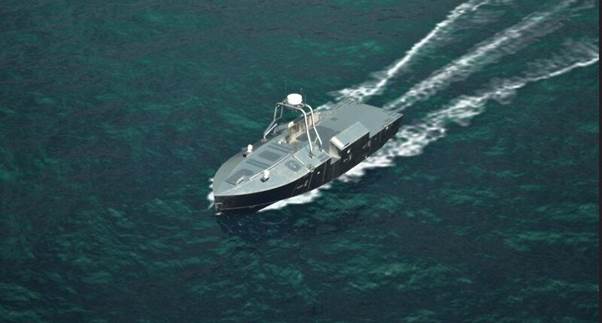
Textron Systems is expanding its autonomous naval offering with a fifth-generation Multi-Mission Unmanned Surface Vessel (MMUSV), designed to carry more, go farther and operate in a wider range of naval missions.
Built on the company’s standard design for unmanned surface vehicles (USVs), the new vessel carries approximately twice the payload of previous models, with a capacity of up to 5,900 kilograms (13,000 pounds).
This additional lift, along with greater endurance and extended range, can apparently support roles covering surface warfare, mine countermeasures, intelligence, surveillance and reconnaissance (ISR), and signal intelligence.
A common unmanned surface vehicle (CUSV), which serves as the backbone for the MMUSV design, navigates the open sea. Image: Textron Systems
Designed for contested and challenging maritime environments, the MMUSV can operate in rough seas and with towing loads exceeding 1,800 kilograms (4,000 pounds). It is positioned as a low-cost, rapidly produced system for naval operations.
“Our expertise in design, integration and fielding has consistently delivered unmatched maritime power to the Navy and its allies,” said David Phillips, senior vice president for Air, Land and Sea Systems at Textron.
“The scalability of our systems ensures that MMUSV, the next advancement in our line, delivers improved mission capabilities quickly and efficiently.”
The unveiling follows Textron’s award of the Low-Cost Unmanned Maritime Solution in August 2025, which paved the way for the development, testing and delivery of the MMUSV.
The backbone of MMUSV
The CUSV platform boasts an endurance of over 20 hours and can be launched from ports, water decks and even littoral combat ships.
It integrates autonomous navigation and collision avoidance systems and supports modular payloads tailored to different mission sets.
Side view of the Common Unmanned Surface Vehicle (CUSV), which serves as the backbone for the MMUSV design, navigating the open sea. Image: Textron Systems
Equipped with Textron’s command and control architecture, the CUSV is already being used for mine countermeasure operations, including detection, sweeping and neutralisation.
It appears to comply with NATO standards and is compatible with the SeaLancet data link, while also supporting satellite communications and complying with the Joint Architecture for Unmanned Systems protocol.
Source: here
Analysis of China’s 15th Five-Year Plan and its expected impact on China’s military modernisation
As China enters its 15th Five-Year Plan (2026–2030), Beijing is signalling an acceleration of its long-term military modernisation efforts. The 2027 centenary of the People’s Liberation Army (PLA) will likely include early demonstrations of advanced capabilities, particularly in quantum sensors, artificial intelligence (AI), and counter-hypersonic technologies. Even if these systems are not fully mature, the presentation of prototypes or partial integrations would reflect China’s intention to highlight visible progress as it moves toward broader mid-century goals.
Context
China’s Five-Year Plans function as strategic roadmaps that translate national goals into phased, achievable tasks. The 15th Five-Year Plan continues central themes of strengthening technological self-sufficiency, expanding indigenous innovation capacity, and cultivating a domestic technical workforce. These priorities support not only civilian development, but also China’s ongoing efforts to modernise its military, alongside broader national goals.
The 100th anniversary of the PLA in 2027 adds urgency and symbolic weight to these development targets. The plan discusses emerging technologies such as artificial intelligence-enabled operations, cyber capabilities, and low-altitude systems, reflecting the belief that modern military power is inseparable from rapid advances in science and technology. By emphasising practical research and building strong talent pipelines, China aims to bring scientific advances to military operational status more quickly.
China’s path to the PLA’s 2027 centenary goals
The centenary represents a major turning point for the People’s Liberation Army, and China’s current Five-Year Plan designates 2027 as the first major milestone for short-term modernisation. Analysts continue to assess whether China can reach this threshold. Given the plan’s emphasis on attracting engineers, scientists, and technical professionals, China appears to be deliberately positioning itself to demonstrate significant progress by the anniversary. It is reasonable to expect some form of capability demonstration or modernisation exhibition timed to coincide with the 2027 celebration.
At the same time, structural challenges remain. Corruption, political reshuffling, and institutional pressure may slow or complicate implementation. A 2024 assessment by the US Department of Defence noted that President Xi’s anti-corruption campaigns and associated leadership changes could disrupt the PLA’s progress toward its 2027 targets.
Long-term development goals
Beyond 2027, China’s modernisation timetable extends to 2035 and ultimately to 2049. These long-term goals include transforming the PLA into a world-class, technologically advanced force. According to a 2024 Congressional report, the 2035 goal focuses on achieving higher levels of innovation, major technological breakthroughs, and leadership in key industries. By 2049, marking the centenary of the People’s Republic of China (PRC), China aims to position itself at the forefront of global industry and advanced industrial systems.
To support these milestones, the PRC is following a two-step modernisation plan. The first phase (2020–2035) aims to achieve fundamental socialist modernisation, including strengthening scientific and technological capabilities and increasing national power. The second phase (2035–2049) aims to complete China’s transformation into a powerful and advanced modern socialist country. These goals serve as the broader framework guiding military modernisation efforts aligned with national development.
Current efforts to integrate quantum, AI, and hypersonic technologies
China is pursuing several advanced technologies as part of its broader effort to modernise its military within the expected timeframe, with quantum research and artificial intelligence being the main areas of interest. One major line of development involves quantum gravimeters, which could significantly improve the detection and tracking capabilities needed to counter maritime threats.
A key innovation behind this effort is the absolute atomic gravimeter. This device uses lasers to manipulate atoms falling in a vacuum chamber, creating interference patterns that can be analysed to extract precise measurements of gravitational acceleration. Such instruments underpin China’s efforts towards more powerful quantum detection technologies.
In addition to quantum research, China is also developing artificial intelligence systems designed to counter hypersonic glide vehicles. Studies published in 2022 highlighted AI models capable of predicting the flight trajectory of hypersonic weapons, even when they manoeuvre unpredictably at low altitudes. According to these findings, the technology could enable defensive systems to generate a response within a three-minute window, significantly reducing the tactical advantage that hypersonic gliding vehicles are designed to provide.
The 15th Five-Year Plan and the centenary in 2027 are unlikely to represent a major strategic shift. Instead, they are designed to reinforce expectations of steady and continuous progress ( ). Highlighting incremental advances in missile forces and AI-assisted detection allows Beijing to strengthen deterrence both domestically and abroad, while remaining aligned with its long-term modernisation goals.
Alongside elite offensive systems, China appears increasingly focused on countermeasures and resilience capabilities. Investments in quantum detection and AI-based tracking suggest a growing emphasis on early warning, precision detection, and defence against advanced threats, including hypersonic weapons. This orientation contrasts with modernisation approaches that tend to emphasise attack capabilities over detection and resilience.
Although the full integration of quantum and AI technologies remains a long-term goal, sustained funding and an expanding technical workforce indicate continued incremental progress through 2030. By the end of the plan period, China could hold a relative advantage in certain areas of detection and counter-hypersonic capabilities, potentially surpassing competitors whose modernisation efforts remain more focused on offensive systems.
Source: here
Pentagon mobilises industrial base for ‘Golden Dome’ missile defence shield with $151 billion SHIELD award
16 January 2026 – by Richard Pettibone
Golden Dome. Image – Adobe Stock (AI)
The US Missile Defence Agency (MDA) has completed a new round of awards under its Scalable Homeland Innovative Enterprise Layered Defence (SHIELD) indefinite delivery/indefinite quantity (IDIQ) contract, a flexible procurement vehicle with a total ceiling of $151 billion, designed to support layered homeland defence capabilities. This latest expansion brings the total number of qualified suppliers to over 2,400 entities.
The SHIELD contract is a 10-year indefinite delivery/indefinite quantity (IDIQ) agreement designed to serve as the primary acquisition framework for the SHIELD “Golden Dome” missile defence initiative, which allows the Department of Defence and other federal entities to compete orders across a wide range of mission areas. The programme was awarded in phased segments: initially 1,014 companies were selected on 2 December 2025, followed by 1,086 suppliers on 18 December 2025.
The $151 billion ceiling is divided among all beneficiaries. The vehicle allows the MDA and other components of the Department of Defence to quickly compete for orders from tasks in broad technical areas, including artificial intelligence, digital engineering, and directed energy.
To date, the agency has added thousands of companies to the contract vehicle, allowing them to compete for orders and delivery orders during the contract’s order period, which could extend to December 2035 if all options are exercised.
Contractor Winners (Representative List)
The SHIELD programme includes over 2,400 suppliers. The following list identifies some of the key industry participants confirmed in the first three award series:
| Aerospace & Defence Primes | Space & Emerging Technology | Intelligence and IT Services |
| Lockheed Martin | Anduril | Booz Allen Hamilton |
| Northrop Grumman | Maxar Intelligence | Permission |
| Raytheon (RTX) | Sierra Nevada Corp. | International |
| Boeing | Sidus Space | Oracle America |
| HII Mission Technologies | Virtualitica | SAIC |
| IT General Dynamics | Firefly Aerospace | LMI |
| BAE Systems | Axiom Space | Guide House |
The expansion of the SHIELD IDIQ contract reflects the Department of Defence’s strategy to cultivate a broad and competitive industrial base for advanced homeland defence technologies. By qualifying thousands of suppliers, the MDA seeks to protect itself against supply chain vulnerabilities and the rapid obsolescence of defence equipment. The $151 billion ceiling reflects the enormous scope of the Golden Dome initiative, which seeks to integrate sensors and interceptors across all domains — land, sea, air, space and cyberspace — to counter emerging hypersonic and cruise missile threats. This “wide-front” acquisition strategy is designed to accelerate technical iteration through frequent, smaller competitions rather than a single decade-long development cycle.
Source: here
Dutch warship just shot down a swarm of attack drones off the coast of the Kingdom of the
In January 2026, the Royal Netherlands Navy air defence frigate HNLMS Evertsen joined NATO’s Sharpshooter exercise at the Aberporth range in the United Kingdom, approximately 20 miles off the coast of Wales. Over three days, the ship faced coordinated attacks using QinetiQ’s Banshee Whirlwind aerial targets, Hammerhead unmanned surface vessels and virtual threats. The Dutch Navy said the Evertsen destroyed five aerial drones and neutralised two surface targets, highlighting the challenge of defeating large numbers of low-cost systems.
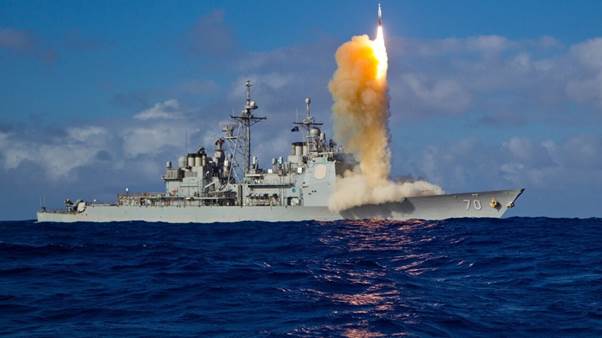
A Standard Missile-3 (SM-3) Block 1B interceptor missile is launched from the guided-missile cruiser USS Lake Erie (CG 70) during a test by the Missile Defence Agency and the US Navy in the Central Pacific. The SM-3 Block 1B successfully intercepted a target missile launched from the Pacific Missile Range Facility at Barking Sands, Kauai, Hawaii. The Lake Erie detected and tracked the target with its AN/SPY-1 radar. The event was the third consecutive successful interception test of the SM-3 Block IB missile. (US Navy photo/Released)
Dutch frigate shoots down swarm of drones in live-fire NATO exercise
In January 2026, a Royal Netherlands Navy frigate engaged several unmanned targets with live fire during a NATO exercise off the coast of Wales, marking one of the clearest public demonstrations yet of how European navies are preparing for the rapid proliferation of drone use at sea.
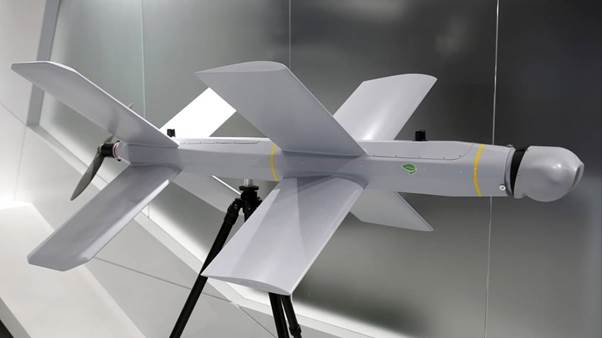
Lancet Drone. Image credit: Russian State Media.
The air defence frigate HNLMS Evertsen participated in the Sharpshooter exercise at the British Ministry of Defence’s Aberporth test range, operating approximately 20 miles offshore in the Irish Sea, according to British defence contractor QinetiQ, which is conducting the exercise under a long-term agreement with the British government.
“Over three days at MOD Aberporth, the Dutch ship HNLMS Evertsen, located 20 miles off the coast of Wales, was the target of simulated drone attacks. QinetiQ’s aerial drone target, Banshee Whirlwind, and the company’s unmanned surface vehicle, Hammerhead, were used, as well as virtual drone attacks,” a statement said.
During the exercise, Evertsen was tasked with detecting and destroying a combination of real aerial and surface drones designed to simulate coordinated attacks. QinetiQ confirmed that the frigate engaged Banshee Whirlwind aerial targets – small, jet-powered drones commonly used to replicate fast-moving, low-flying threats – as well as Hammerhead unmanned surface vessels, designed to mimic boats laden with explosives.
The Royal Netherlands Navy said the ship successfully destroyed five aerial drones and neutralised two surface targets during several days of sustained activity.
The exercise was notable not only for its use of real targets, but also because it was the first time a non-British NATO warship had participated in Sharpshooter, which combines real engagements with computer-generated threats such as simulated cruise missiles and hostile aircraft.
The timing is also significant: drone attacks have become a common feature of modern conflicts – from Ukraine to the Red Sea – while China recently claimed to be implementing a new high-powered microwave system, known as Hurricane 3000, designed specifically to disable swarms of drones.
How NATO warships are learning to fight drones
HNLMS Evertsen is part of the Dutch Navy’s De Zeven Provinciën class – a group of frigates designed in the early 2000s primarily for air defence and fleet escort.
The ships were originally built to track and engage aircraft and missiles using advanced radar systems and guided missiles, rather than to counter large numbers of small, inexpensive drones – which is precisely why exercises such as Sharpshooter really matter.
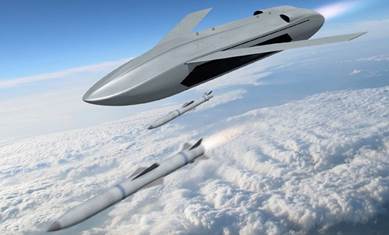
Image: Creative Commons.
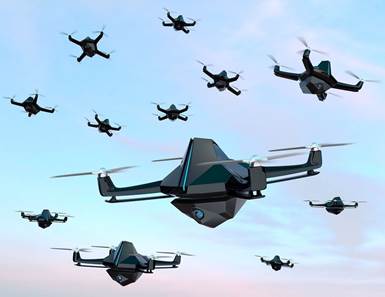
The US military’s swarm of drones. Image: Creative Commons.
Drones such as the Banshee Whirlwind cost a fraction of traditional missiles and can be launched in large numbers, forcing defenders to respond repeatedly and at high cost. QinetiQ says the Whirlwind was chosen because it can fly at low altitude and high speeds, much like the types of unmanned aircraft now seen in combat zones.
Hammerhead surface drones (automated vessels), meanwhile, add an extra layer of pressure on ships. Similar unmanned boats have been used in real attacks in the Black Sea and Red Sea, targeting both warships and commercial vessels – and by combining air and surface threats, Sharpshooter tested how quickly crews can detect, identify and respond to attacks coming from multiple directions simultaneously.
QinetiQ also described how integrating synthetic threats (computer-generated attacks with missiles and aircraft) into scenarios allows navies to practise decision-making under pressure without the cost of launching real missiles for each simulated attack.
Drone warfare raises the stakes
The exercise comes on the heels of a major shift in naval warfare. In Ukraine, drones have been used not only for surveillance, but also for direct attacks on ships and infrastructure, including strikes on Russian ships in the Black Sea. In the Red Sea, Houthi forces have launched drones and missiles at international shipping lanes, forcing Western navies to deploy on a near-daily basis in defensive operations.
These changing dynamics have made it clear to all militaries on the planet that traditional air defence systems are no longer sufficient and cannot cope with constant low-altitude drone attacks. This has generated interest in various alternatives, from lasers to electronic jamming and microwave weapons.
China’s state-owned defence industry now claims that the Hurricane 3000 system is operational and can disable drones at ranges of over three kilometres by damaging their electronics, rather than shooting them down individually.
If such systems work as advertised, they could shift the balance of power between attack and defence, allowing a single weapon to affect multiple drones simultaneously – theoretically eliminating the advantage gained by countries such as Ukraine through the rapid growth of their drone manufacturing capabilities.
Western navies, however, remain cautious; most have not yet deployed microwave systems at sea, relying instead on layered defences that combine radar, guns, missiles and electronic warfare – but these tactics will ultimately have to change once drones become the norm rather than the exception.
Source: here
The navy’s futuristic $8 billion stealth ship leaves port with containers of hypersonic weapons

By
Published
2 hours ago
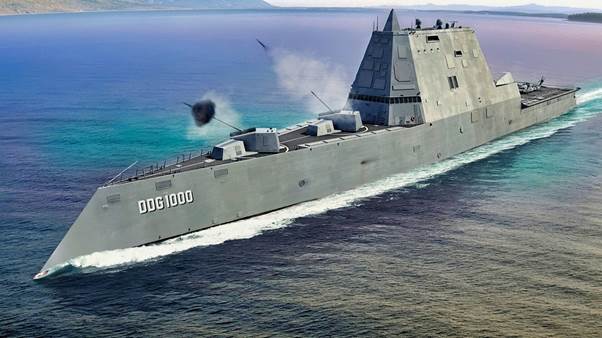
US Navy Zumwalt-class destroyer. Image credit: Creative Commons.
Zumwalt destroyers finally have a mission: hypersonic missiles (summary and key points)
-The US Navy is moving to give the three Zumwalt-class destroyers a defined combat role, re-equipping them to carry the Conventional Prompt Strike hypersonic weapon.
-Originally designed as a stealth naval fire support platform, the class lost its primary purpose after the Advanced Gun System ammunition programme collapsed due to high per-round costs.
-With only three hulls built, the Navy is now betting that up to 12 hypersonic missiles per ship can turn the Zumwalts into valuable long-range strike assets—especially for contingencies in the Pacific.
The concept promises a deep-strike, hard-to-intercept attack, but questions remain about the maturity of the missiles, integration timelines, cost, and whether three ships can advance strategically.
From stealth warship to hypersonic shooter: The Navy’s Zumwalt reboot
The US Navy is moving forward with plans to arm its three Zumwalt-class destroyers with hypersonic missiles—a decision intended to give the long-troubled warships a clearer operational role after years of uncertainty.
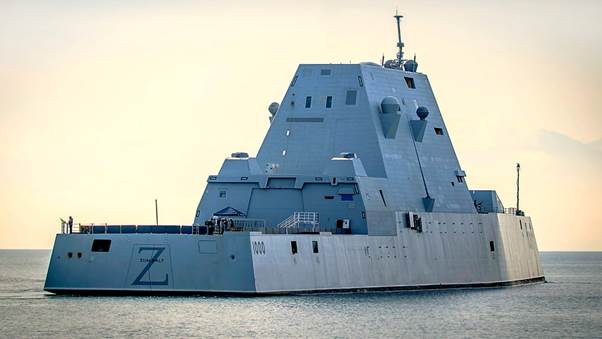
The Zumwalt class, the largest destroyer on Earth today.
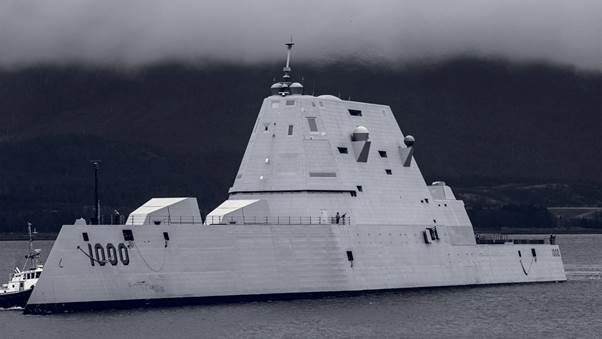
Zumwalt class. Image credit: Creative Commons.
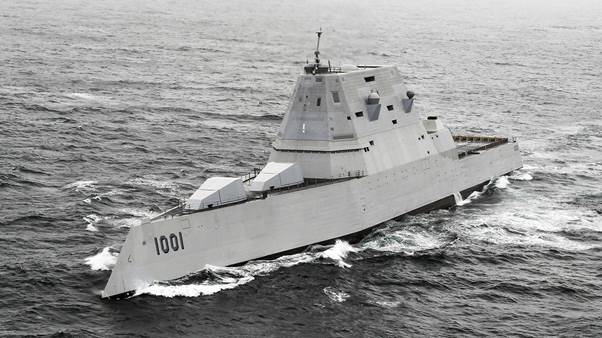
210421-N-FC670-1062 PACIFIC OCEAN (21 April 2021) The Zumwalt-class guided missile destroyer USS Michael Monsoor (DDG 1001) participates in the US Pacific Fleet’s Unmanned Systems Integrated Battle Problem (UxS IBP) on 21 April. UxS IBP 21 integrates manned and unmanned capabilities in challenging operational scenarios to generate combat advantages. (U.S. Navy photo by Chief Mass Communications Specialist Shannon Renfroe)
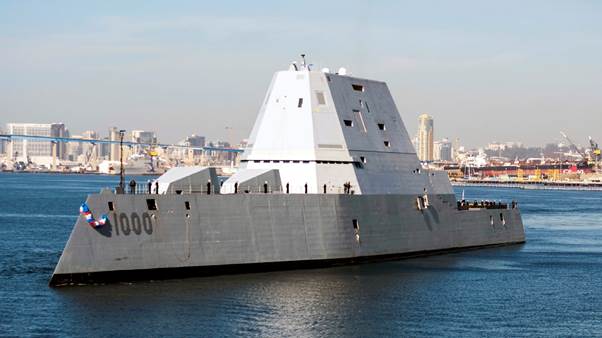
SAN DIEGO (8 December 2016) The guided-missile destroyer USS Zumwalt (DDG 1000) arrives at its new homeport in San Diego. Zumwalt, the Navy’s most technologically advanced surface ship, will now begin combat system installation, testing and evaluation, and fleet operations integration. (U.S. Navy photo by Petty Officer 3rd Class Emiline L. M. Senn/Released)
The plan, which involves refitting ships to carry the Navy’s Conventional Prompt Strike hypersonic weapon, is now underway as part of a broader US military effort to deploy long-range strike capabilities for potential future conflicts — particularly in the Pacific.
And, in fact, the USS Zumwalt was recently seen leaving port for the first time in years, heading for sea trials with new capabilities ready for testing.
Once conceived as the future of surface warfare, the Zumwalt class has spent much of its existence under scrutiny.
Designed with an angular stealth hull, an integrated electric propulsion system, and a high level of automation, the destroyers were originally intended to provide advanced naval fire support near the shore. Instead, rapidly rising costs, a shortened production run, and the collapse of the programme’s flagship weapon – the Advanced Gun System and its expensive Long Range Land Attack projectile – left the ships without a real purpose.
Only three hulls were ever built, despite billions of dollars invested in the programme – and now, the Navy is betting that hypersonic weapons – capable of travelling at speeds exceeding Mach 5 and striking targets hundreds or even thousands of miles away – can transform the Zumwalt class into a significant strategic asset. Whether this new role will ultimately prove to be the decision that makes the Zumwalt destroyers relevant will soon be seen.
From stealth warship to hypersonic launcher
When the Zumwalt programme was first launched in the early 2000s, it aimed to produce 32 advanced destroyers capable of supporting amphibious landings and providing precision naval firepower. However, budget overruns and shifting strategic priorities reduced the order first to seven and eventually to three hulls: the USS Zumwalt (DDG-1000), the USS Michael Monsoor (DDG-1001) and the USS Lyndon B. Johnson (DDG-1002).
The class’s original signature weapon, the Advanced Gun System (AGS), which fired the Long Range Land Attack projectile, never came close to reaching its potential. The development of the projectiles was eventually cancelled because the costs had risen so high – reaching hundreds of thousands of dollars per round – that the system became operationally and financially impractical. With no other type of ammunition available, the destroyers sailed with virtually no offensive weaponry.
These failures were a central point of criticism of the platform. The Zumwalt was largely described as a mistake and a costly experiment that failed to deliver a clear combat role. Some estimates put the cost of the ship at around $8 billion – significantly higher than many other hull-based surface combatants.
This is where hypersonic weapons come in: each destroyer can carry up to 12 hypersonic missiles, providing a deep strike capability that complements its existing vertical launch systems that already house Tomahawk cruise missiles. The new weapons are part of a broader strategic shift for the US Navy towards the deployment of long-range precision strike weapons as competition between the major powers with China and Russia intensifies.
What’s next?
The decision to make existing Zumwalts capable of hypersonic operation has been met with praise. The ships likely fill a critical gap in the US Navy’s long-range strike arsenal.
Hypersonic weapons such as these — which can manoeuvre in flight at speeds greater than Mach 5 — are harder to detect and intercept than traditional ballistic or cruise missiles. This new capability will allow commanders to strike far beyond enemy air defence ranges, enabling Zumwalts to deter aggression in high-stakes theatres such as the Indo-Pacific.
The Zumwalts will be used as forward bases for hypersonic missiles, possibly alongside equally capable submarines, in hubs such as Hawaii.
However, some significant questions remain. Hypersonic missiles are still under development, and testing is ongoing. A successful hypersonic test by the CPS Navy at Cape Canaveral in mid-2025 showed progress — but full integration into combat systems is still years away. The cost of acquiring and maintaining hypersonic missiles is also substantial, with some estimates suggesting it will cost tens of billions of dollars over decades if implemented on a large scale.
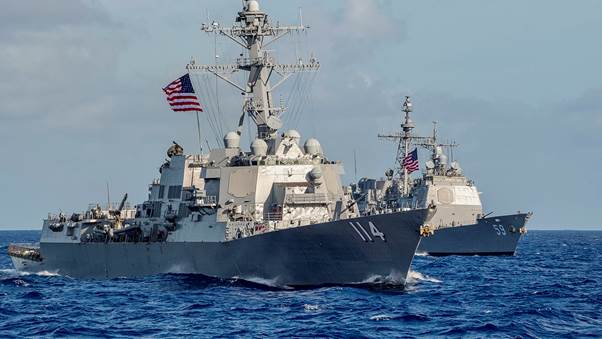
The Arleigh Burke-class guided missile destroyer USS Ralph Johnson (DDG 114) and the Ticonderoga-class guided missile cruiser USS Princeton (CG 59) sail in formation during dual-carrier operations with the Nimitz and Theodore Roosevelt carrier strike groups (CSG). Two-carrier operations combine the tactical power of two individual strike groups, providing fleet commanders with a credible, unified and unmatched fighting force capable of operating indefinitely. The CSGs are on scheduled missions in the Indo-Pacific.
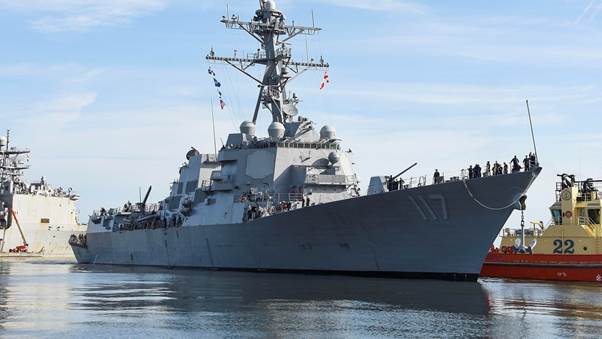
190731-N-ED185-1017 MAYPORT, Fla. (31 July 2019) Arleigh Burke-class guided-missile destroyer USS Paul Ignatius (DDG 117) prepares to dock at Naval Station Mayport. Paul Ignatius, the Navy’s newest Arleigh-Burke class destroyer, was commissioned in Fort Lauderdale, Florida, on 27 July 2019 and will call Naval Station Mayport its new home. (U.S. Navy photo by Mass Communications Specialist 1st Class Brian G. Reynolds/Released)
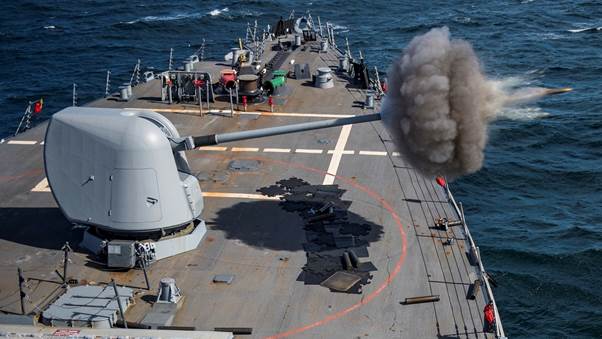
(14 January 2018) Arleigh Burke-class guided-missile destroyer USS Ross (DDG 71) fires its 5-inch gun during a surface fire support naval exercise with the Royal Moroccan Navy as part of Exercise African Sea Lion. Among the objectives of African Sea Lion is to test and evaluate the ability of the U.S. and Morocco to conduct coordinated and combined surface naval fire support exercises at the Tan Tan firing range. Ross, forward-deployed to Rota, Spain, is on its sixth patrol in the U.S. 6th Fleet area of operations, supporting regional allies and partners and U.S. national security interests in Europe and Africa. (U.S. Navy photo by Mass Communication Specialist 1st Class Kyle Steckler/Released)
Furthermore, there aren’t many Zumwalts to work with: only three. This limited number of ships raises questions about how significant or meaningful an impact these ships can have on the overall force, especially when compared to the Navy’s larger Arleigh Burke-class destroyers and planned future warships.
Each Zumwalt’s stealth capability and advanced electrical power system are technological achievements, but they are more useful when deployed in greater numbers — especially in a combat scenario.
The new hypersonic capability may not save the Zumwalt programme, but it may determine the best way to use a costly mistake.
With only three ships in service and no plans for new ships, the inclusion of new hypersonic missiles could pave the way for future ships and platforms equipped with hypersonic weapons.
Source: here
Russia’s new Amur-class stealth submarine, summarised in a single

By
Published
2 hours ago
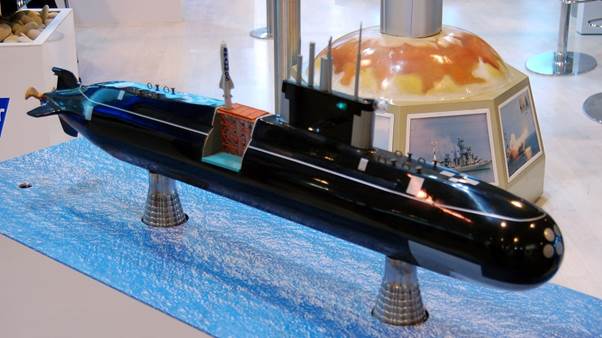
BrahMos missiles on a model of a non-nuclear Lada-class submarine. MAKS-2009.
Amur-class submarine: What you need to know
Russia’s Amur-class attack submarine is marketed as an export-oriented evolution of the Lada/Kilo family of designs, with two variants intended for different missions. The smaller Amur-950 emphasises a compact platform with vertical launch cells for rapid missile salvos, while the larger Amur-1650 is presented as a longer-range option. Promised advantages include AIP endurance, modern electronic warfare systems and reduced acoustic signatures. However, the main problem with the programme is credibility: no Amur boats have been built, the Lada line has faced delays and performance issues, and Western European alternatives offer proven delivery records — complicating any export hopes, including presumed interest from Morocco.
Russia’s “Amur-class” submarine has 10 VLS cells — and it has not yet been built
The Amur River forms part of the border between northeastern China and southeastern Siberia. This vast expanse of water gave its name to an old Soviet-era propaganda military song, “The Song of the Partisans,” also known as “The Song of the Amur River Partisans.”
And even though the Amur River is obviously a freshwater body, the Russian Navy had no qualms about naming a class of saltwater warships in its honour: the Amur-class attack submarine.
Premise and promise
The Amurs have not yet been built; if they are eventually assembled and commissioned, they will be fourth-generation vessels, the newest attack submarines in the Russian Federation Navy. That automatically makes them an important issue.
They are presented as an export version of the Project 677 Lada class submarine, which in turn is a modified version of the ubiquitous Project 877 Paltus, or Kilo class boats. The future builder is the Rubin Central Design Bureau for Marine Engineering, Admiralty Shipyard, in the city of St. Petersburg.
Eleven Amur-class ships have been planned so far. There are two variants: the Amur-1650 is larger and intended for longer missions, while the Amur-950 is equipped with a vertical launch system (VLS) for rapid missile launch at multiple targets.
Amur class technical specifications and vital statistics
Courtesy of GlobalMilitary.net:
– Displacement: 950 tonnes
– Hull length: 58.8 metres
– Draft: 6.5 metres
– Beam: 5.65 metres – Propulsion: 2 x AIP (air-independent propulsion) diesel engines with a power output of 5,400 hp – 1 propeller
– Maximum speed: 20 knots
– Maximum depth: 250 metres
-Range: 600 kilometres
-Autonomy: 45 days of autonomous operation
– Crew: 18 commissioned officers and enlisted sailors
– Armament: 4 x 533 mm torpedoes with 16 torpedoes in magazine + 10 VLS cells.
According to Baird Martime, those 10 VLS cells will use BrahMo cruise missiles.
Both variants will use advanced electronic warfare (EW) systems and will have the advantage of reduced sonar signatures compared to their Kilo-class predecessors — the so-called “Black Hole” submarines.
The way forward for the Amur-class submarine?
These warships are primarily intended for export, and reports in early 2025 indicated that Morocco could be a customer for Russia’s much-lauded Amur-1650 diesel-electric submarines. Some publications suggest that the North African nation was evaluating offers alongside those from European shipbuilders as it seeks to acquire its first submarines.
A sale to Morocco could create some tension with the United States. Morocco is America’s oldest friend, unofficially dating back to December 1777 (in the middle of the War of Independence) and officially formalised by the 1786 Treaty of Peace and Friendship.
This set the stage for what has become the longest formal bilateral relationship in US history. In the spirit of this friendship, one might wonder whether Washington would offer Rabat a deal to counter Moscow.
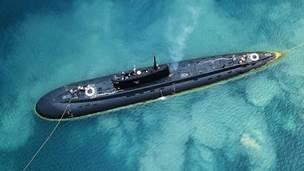
Kilo-class submarine. Image credit: Creative Commons.
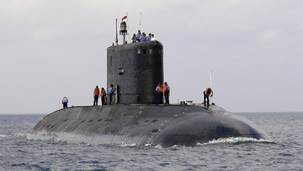
Kilo-class submarine.
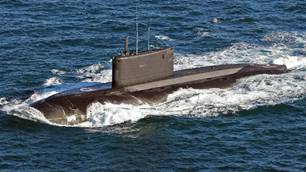
Pictured is a Russian Kilo-class submarine in the English Channel. The image was taken from the Royal Navy’s HMA2 Wildcat helicopter from Naval Air Squadron 815. Kilo class is the NATO reporting name for the diesel-electric attack submarine.
However, there are a few minor issues with the Amurs’ international sales prospects—whether to Morocco or any other potential buyer. First, as already mentioned, none of them have been built yet; this makes them extremely difficult to sell against competing models from Western Europe, such as France’s Scorpène class and Germany’s Type 214/A series.
Furthermore, the Amur class is based on the Lada class—and the Lada programme has encountered repeated delays and performance problems.
According to Global Military, the Amur is not expected to be commissioned until 2030. Time will tell.
Source: here
US captures another tanker in context of Venezuelan oil transfer to Caribbean storage
- Venezuelan crude oil cargoes previously destined for China, now in the shadow fleet, are heading for storage facilities in the Caribbean
- The blockade continues to catch sanctioned tonnage; the US seized the Aframax Sagitta in the Caribbean on Tuesday morning
- As more Venezuelan crude oil arrives in the US, more Canadian and/or American crude oil is reportedly being introduced into the export market
It is still very early days, but America’s bold plan to control oil exports from Venezuela is showing signs of progress amid continued defiance of the US blockade. Owners of tanker-compliant tonnage stand to gain
Source: EGT – stock.adobe.com More shipments have been sent to hubs in the Caribbean. Pictured: storage facilities in Curaçao.
The US takeover of Venezuela’s crude oil exports is in full swing, promising a shift in volume from shadow fleet tankers to compliant tonnage.
Venezuelan crude exports to the US via Chevron’s licence continue, American naphtha is heading to Venezuela to be used as a diluent, and authorised Venezuelan crude is moving to storage facilities in the Caribbean, where it is being marketed for sale by trading houses Trafigura and Vitol.
However, there are still tankers attempting to break the US blockade. The US is seeking to transition to a market where it controls Venezuelan export flows while simultaneously tracking goods it does not yet control.
The US Southern Command announced that it had seized the Aframax Sagitta (IMO: 9296822) authorised in the Caribbean on Tuesday morning. It was the seventh seizure since the blockade was imposed last month.
“The seizure of another tanker operating in contravention of President Trump’s quarantine on sanctioned vessels in the Caribbean demonstrates our determination to ensure that the only oil leaving Venezuela is that which is properly and legally coordinated,” Southcom said.
Shift to Caribbean storage
“The main headline here is the resurgence of the Caribbean as a key source,” said Claire Jungman, director of maritime risk and intelligence at Vortexa, during an online Vortexa presentation on Tuesday, prior to Southcom’s announcement.
Since the start of the U.S. blockade on Venezuelan exports on 10 December, “approximately 20% of Venezuela’s maritime crude exports have shifted to Caribbean destinations, including the Bahamas, Curaçao and Saint Lucia,” she said.
“This shift is not about end demand; It’s about clearing and logistics under pressure. Trading houses have received and moved Venezuelan crude oil to storage facilities in the Caribbean this month as part of licensed trading and repositioning activities, in line with new export arrangements under US supervision.
“The Caribbean is functioning as a staging and waiting area. Shipments are being moved to Caribbean hubs to buy time, whether it’s waiting for downstream buyers or resale opportunities, or greater clarity on sanctions enforcement and licensing conditions, given the evolving regulatory environment,” she explained.
Vortexa tracks both Venezuelan oil on the water and the percentage seized by the US. Oil on the water remains high, at around 70 million barrels, while the share seized has increased from 5% in mid-December to nearly 9% currently.
“Even with the seizures, the vast majority of oil on the water remains unseized, leaving significant volumes either exposed to further interdiction or poised for re-export or legitimate movement once greater policy clarity emerges.
“Taken together, the picture here is not one of flows stopping; it is one of flows being redirected. The Caribbean has become the focal point because it offers optionality under pressure, even as enforcement tightens.”
It is still early in the transition, and uncertainty remains high, as Tuesday’s seizure of the Sagitta highlighted.
“The combination of rising oil-on-water levels, increased seizures and rising levels in the Caribbean suggests continued volatility and execution risk rather than stabilisation outside Venezuela,” Jungman said.
Movements of tankers from Venezuela
Ship position data from Lloyd’s List Intelligence’s Seasearcher and cargo data from Vortexa show a series of recent movements related to the transitional storage strategy in the Caribbean.
Aframax Volans (IMO: 9422988) loaded 558,285 barrels of Merey crude in Venezuela on 24 December; the vessel remained anchored until 17 January, when it moved to Curaçao.
Aframax Jamaica (IMO: 9230098) loaded 453,470 barrels in Venezuela on 1 January and unloaded in Curaçao on 18 January.
The very large crude carrier Kelly (IMO: 9191400) loaded 1.8 million barrels on 14 December, remained anchored after the US blockade was imposed, and departed on 13 January, arriving in Saint Lucia on 18 January.
VLCC Marbella (IMO: 9222455) loaded 1.6 million barrels on 11 January and arrived in the Bahamas on 19 January; it is currently being unloaded.
VLCC Rene (IMO: 9250622) loaded 1.3 million barrels on 31 December and is heading for the Bahamas; it is currently passing through the Windward Passage between Cuba and Hispaniola.
Source: here
High stakes in the High North
Since the beginning of the year, tensions over Greenland have risen as a result of renewed demands by Donald Trump, President of the United States (US), to take control of the world’s largest island from Denmark – an ally of the North Atlantic Treaty Organisation (NATO). The United Kingdom (UK), Denmark and six other European countries now face 10% tariffs from Washington as a result of their vocal support for Greenland’s self-determination.
In response to this development, Sir Keir Starmer, the Prime Minister, gave a speech on 19 January, during which he called for “calm discussions between allies” and noted that the threat of tariffs against allies is “completely wrong,” then emphasising that the UK and the US are “close allies and close partners.” That relationship matters profoundly.
Militarily threatened by the regime of Vladimir Putin, President of Russia; faced with growing geo-economic challenges from the People’s Republic of China (PRC); and now, with the decades-old transatlantic defence apparatus under pressure, the UK and its European allies have an urgent need to increase defence spending and strengthen their societies to ensure their security in a new era of fragmentation and geopolitical competition.

- The UK and Ukraine marked the first anniversary of their 100-year partnership by announcing several new initiatives focused on strengthening Ukraine’s security. This includes a £20 million package of energy infrastructure support to strengthen Ukraine’s energy security, following the intensification of Russian attacks on Ukraine’s energy sector, and the expansion of a school twinning programme. On the anniversary, Yvette Cooper, Minister for Foreign Affairs, said:
Our support for Ukraine in continuing to resist Putin’s barbaric war is unwavering, and our ongoing support for energy security and resilience will help keep the lights on and heat Ukrainian homes when vulnerable civilians need it most.
- Sir Keir met with Karol Nawrocki, the President of Poland, on 13 January at 10 Downing Street to discuss bilateral relations between the UK and Poland. They agreed that both nations would deepen their relationship, including security cooperation in areas such as “enhanced training” initiatives and an agreement to “explore the development and acquisition of new capabilities to counter a wide range of air threats.” Referring to Ukraine, the two leaders agreed on the importance of ensuring a just and lasting peace and will continue discussions on security guarantees for Kyiv as part of the Coalition of the Willing.
- The Ministry of Defence (MOD) announced that the new accommodation and specialist training facilities at Duke Gloucester Barracks will benefit the 13th Signals Regiment, which conducts defensive cyber operations for the British Army. The £279 million contract will also see the barracks house the Army’s Cyber, Information and Security Operations Centre, which will protect networks from cyber threats – both domestically and abroad, during exercises and operations.
- The UK and Sweden are set to step up bilateral defence cooperation in the Baltic Sea and the Northern Dimension to tackle growing security risks in both regions. In a speech on 13 January, John Healey, Secretary of State for Defence, outlined the threat that Russia poses to both countries and highlighted the activities of the UK and Sweden to counter these challenges. These include efforts to support Ukraine, increasing the activity of the Joint Expeditionary Force (JEF), and Sweden’s accession to NATO in March 2024.
- The Foreign Secretary made a statement on Greenland and broader Arctic security to the House of Commons on 19 January. In his speech, he emphasised Her Majesty’s Government’s (HM) position, firstly that Greenland’s future is a matter for “Greenlanders and Danes… alone”, and secondly that the threat of tariffs against allies is unjustified and counterproductive. Finally, Cooper stated that Arctic security is a “shared concern and shared responsibility for both sides of the Atlantic,” which can only be addressed and maintained through “cooperation between transatlantic allies.”
- Last week, the Department for Energy Security and Net Zero (DESNZ) announced a “record” 8.4 gigawatts (GW) of offshore wind capacity secured in “Europe’s largest offshore wind auction”. This round of auctions, known as AR7 Contracts for Difference, will provide enough clean electricity to power the equivalent of 12 million homes.

How the UK stacks up against its competitors
- Dmitry Peskov, press secretary to the President of the Russian Federation, made a statement in which he claimed that the United Kingdom’s position on Russia’s large-scale invasion of Ukraine is “destructive in nature.” This was in connection with reports that France, Germany and Italy want to “resume dialogue with Russia on Ukraine.” Only Russia’s actions can be described as destructive in nature, as the Kremlin has launched a war of conquest against its neighbour.
- TASS reported on a statement made by Andrey Kelin, Russia’s ambassador to the United Kingdom, in which he claimed that “British plans to intercept Russian ships effectively represent a return to the age of piracy.” Kelin warned that the United Kingdom “has long ceased to be the ‘ruler of the seas’ and its actions will not go unpunished.” Russia is solely to blame for the actions taken by the United Kingdom and its allies and partners, and the Kremlin has a long history of interfering in the activities of other states.

Show me the money
On 12 January, Air Chief Marshal (ACM) Sir Richard Knighton, Chief of the Defence Staff, was questioned by the Select Committee on Defence. One of the key themes of the session was the issue of defence funding, following reports of a £28 billion funding gap over the next four years. While many of the UK’s European allies have presented their fiscal plans to reach 3.5% of Gross Domestic Product (GDP) spending on defence by 2035, the UK has yet to do so. The Defence Investment Plan was due to be published in autumn 2025, but continues to be delayed due to several factors.
Despite these issues, one thing is important to note: for the first time in decades, British Armed Forces planners can work on the assumption of higher investment in the future. Defence spending has already increased (albeit not by much), with the expectation that it will reach 2.6% of GDP in 2027.
However, these incremental increases do not match the strategic context facing the United Kingdom. They may have been adequate a decade ago, but now Britain needs to go further and faster to restore its capabilities as a major power.
Within European NATO, Britain risks losing the position of influence it has traditionally held, although its nuclear arsenal ensures that this can only fall so far. Just a few years ago, Britain was the second-largest defence spender in European NATO as a percentage of GDP. Now, it is not even in the top ten. While European allies are rapidly expanding and deepening their capabilities, the British Armed Forces face numerous capability gaps that appear to be persistent for the time being.
ACM Knighton faced a difficult challenge in explaining the delays and made many good points. In particular, he noted that it is more important for the Defence Investment Plan to be good than to be published as soon as possible, and that defence planners can only spend what Her Majesty’s Government is willing to give them.
Given all the geopolitical shocks so far, it is hard to imagine what kind of disaster would be needed for Her Majesty’s Treasury to change its mind about the budgets allocated.
Source: here
The meaning of “America First” is changing
MAGA will have to deal with divisions in its approach to foreign policy
People used to think that Donald Trump was essentially an isolationist or a “restrainer,” a kind of soft isolationist. The air strikes in the Middle East during his first term could be attributed to the neoconservatives around him. Then the president returned to power and attacked Venezuela, Nigeria, Iran, Iraq, Syria, Somalia and Yemen. He is launching a pressure campaign for Greenland, which he says is “psychologically necessary for success.” Theorists of international relations now compare him to a 19th-century realist seeking natural resources. Others see a man who enjoys domination and the unilateral exercise of power for power’s sake.
Mr. Trump acts on instinct, not ideology. He is petty and prefers to see his name on buildings and maps. His desire for Greenland stems partly from his being overlooked for a Nobel Peace Prize and partly from a desire to rival Thomas Jefferson’s acquisition of Louisiana. The fact that he could torpedo NATO in the process is secondary. However, for more methodical MAGA thinkers, this is a central project.
In fact, Mr. Trump’s flexibility hides the fact that within the MAGA movement there are coherent — and sometimes competing — ideologies about how America should exercise power in the world. J.D. Vance, his vice-president, is more serious about restraint and more dismissive of European liberal democracies. Other advisers — Marco Rubio, Stephen Miller — still show different reflexes. They are worth analysing because they will outlast Mr. Trump. Their ideas have a lineage and a future beyond the president’s personality.
“America First” once meant aggression towards China; contempt for multilateral organisations; and disinterest in Ukraine, which may seem a lot like Russophilia. These are still principles. But the scope of action has changed. Now, America First also means dominating the Western Hemisphere by destroying cartels, claiming Greenland’s rare minerals, and confiscating Venezuelan oil. This last piece is completely new. During the campaign, Mr. Trump was very interested in the people of Latin America who crossed the US-Mexico border, but not at all in Latin America itself, notes Julian Waller of George Washington University. In Europe, the Trump administration increasingly wants to use its influence to “reform” (i.e., force) liberal governments to become more MAGA.
Mr Trump says that America First means whatever he decides, and his only constraint is “his own morality”. He has convictions: an antipathy to endless wars, nation building, trade deficits and allies who take advantage. But otherwise he is flexible. He wants to turn his back on China, but he would like to win a peace prize and not be perceived as a failure. He is impulsive: he bombed Islamic militants in Nigeria after watching a segment on Fox News about besieged Christians. His control over the Republican Party makes his voters adapt to his inconsistencies.
Anyone looking for a more coherent worldview can look to his advisers. The National Security Strategy (NSS), published in December, articulated their priorities. The document was both their attempt to justify their boss’s instincts and to uphold an ideology, but also to promote their own causes. It contained two remarkable statements: the Trump Corollary (later called the Donroe Doctrine), which asserts American primacy in the Western Hemisphere, and a warning about the “civilisational wipeout” of Europe.
The Donroe Doctrine had its first success with the removal of Nicolás Maduro in Venezuela. The faces of that operation were Mr Rubio, the Secretary of State, and Mr Miller, a tough adviser. Mr Rubio is a traditional Republican and the son of Cuban immigrants. His interest in overthrowing communist dictatorships in the region and sowing democracy there is deep and personal. He is reminiscent of the bellicose evangelism of a neoconservative — which he was during his 14 years in the Senate.
Mr. Miller’s interest in the Western Hemisphere is driven by immigration. At home, he has orchestrated the administration’s deportation machine, with its theatricality and supposed focus on criminals. This helps explain the attacks on boats in the Caribbean and the designation of cartels as foreign terrorist organisations. In fact, the campaign in Venezuela marked an “outsourcing” of a domestic agenda that brings military power to the fight against drugs and immigration, says Jennifer Kavanagh of Defence Priorities, a think tank. The goal is domination everywhere, including American cities.
After the release of the NSS, some interpreted the Trump administration as adopting a sphere of influence approach. This would imply American pre-eminence in the Western Hemisphere, leaving China and Russia to do as they please in their own backyards. This is a misinterpretation, says Patrick Porter, professor of geopolitics at the University of Birmingham, UK, because it would imply a mutual division of the globe. In fact, the administration still wants to project power in Europe and stop Russian expansionism.
The hawks have been frustrated. Last year, the Trump administration secured a commitment from European countries to spend 5% of GDP on defence, which will require some budgetary sleight of hand to achieve. This is not a victory, says Ms Kavanagh, but a concession. Her camp wants America to leave Europe, period.
Instead, the Trump administration is setting conditions on American protection and suggesting that it will withdraw from NATO, a cornerstone of the country’s security strategy since the Cold War. Mr. Vance supported them in Munich last year in a speech full of contempt for European governments. He said Europe would have to confront the “enemy within,” meaning woke elites who censor speech, support open borders, and refuse to govern in coalition with far-right populists. The NSS echoes these themes. It warns that Europe will be “unrecognisable” in 20 years if it does not recover. The Trump administration is pushing it. After the strategy was launched, the State Department imposed a visa ban on a former EU commissioner and architect of the Digital Services Act, a European law that requires content moderation by technology companies. MAGA blames him for suppressing its views.
Mr. Vance is the most dedicated MAGA thinker in the administration. He reflects the intellectual vibes of the new right. Their perspective is often influenced by Catholicism and can be deeply pessimistic and fraught with cultural anxiety. Nathan Pinkoski of the Centre for Renewing America, a new right-wing think tank, says that strategic rivalry with China has crystallised an “identity crisis” among MAGA people. They looked around and saw a West weakened by mass migration and wokery. “If we want to be able to deal with our geopolitical rivals, we have to fix our own problems,” he says. He anticipates a more aggressive use of economic tools against Europeans whenever “we perceive them to be moving away from their civilisational heritage.”
Of course, there are contradictions here that MAGA has yet to clarify. Antagonising Europeans with tariffs, sanctions and visa bans will not help in the competition between the great powers and China. America cannot give up on European defence and at the same time force Europeans to govern in the MAGA style. “Burden shifting and civilisational politics do not go hand in hand,” says Sumantra Maitra, who supports the former approach and calls the supporters of the latter “practically neoconservatives”. He predicts a future battle that will effectively “swallow up” the MAGA movement. It’s easy to understand what the Democrats stand for, he says. They are internationalists. The other side? Unresolved. ■
Stay up to date with American politics with The US in Brief, our daily newsletter with quick analyses of the most important political news, and Checks and Balance, a weekly note that analyses the state of American democracy and the issues that matter to voters.
Source: here
Ukraine receives surface drone from Latvia

Ukraine has received the Fog surface drone (USV) from the Latvian company NEWT21. This small vessel is primarily intended for patrol and surveillance, search and rescue missions and has offensive capabilities. It is marketed for use at sea and on rivers, as well as for offensive and defensive missions.
Equipped with a wide range of sensors, it can perform autonomous reconnaissance and surveillance both on the surface and underwater. Its payload is quite modest, but it could be used in an anti-ship role, similar to the Ukrainian Magura and Sea Baby types.
The device has similar overall dimensions to the classic Ukrainian Magura V5 USV, but is slightly smaller due to the narrower width of its carbon fibre body. However, the large, wing-like sponson at the stern gives it a similar overall appearance to the Magura.
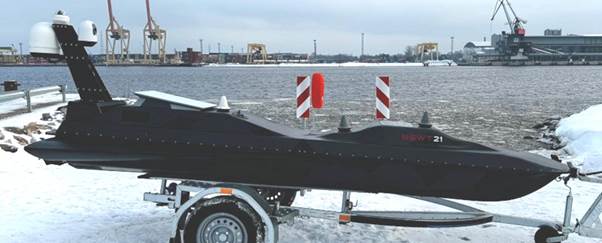
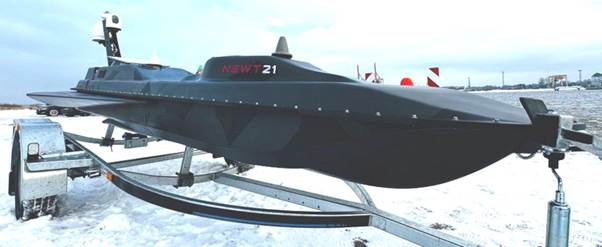
Specifications
Length: 4.5 m
Width: 1.5 m
Empty weight: 135 kg
Payload: up to 200 kg
Speed: 27 knots (50 km/h) cruising, maximum 42 knots (78 km/h)
Power: 90 hp engine driving a water jet, with 30-200 litres of fuel
Range at cruising speed: up to 485 nautical miles (900 km)
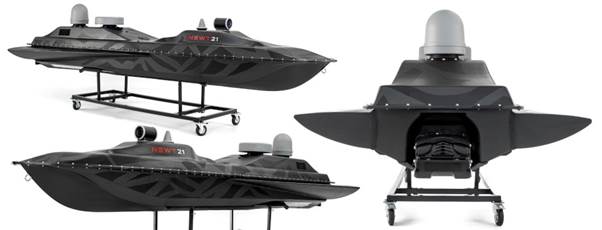
NEWT21 also built the electric catamaran ‘Rey’ USV, used for logistical support in riverine environments, which appears to also be in Ukrainian service.
Source: here
EU freezes approval of US trade deal over Trump’s threats to Greenland
(Bloomberg) — A trade agreement between the US and the European Union is on hold after the European Parliament decided to freeze the ratification vote in response to President Donald Trump’s escalating threats to conquer Greenland.
The Parliament’s trade committee postponed the vote indefinitely on Wednesday, casting doubt on whether the pact will ever reach the finish line.
The agreement has been brought into the deepening crisis between the EU and the US over Greenland, which has brought the transatlantic alliance to the brink of rupture. Trump is currently promising to impose tariffs on several European countries until he is allowed to buy the island, a Danish territory.
“By threatening the territorial integrity and sovereignty of an EU member state and using tariffs as a coercive tool, the US is undermining the stability and predictability of EU-US trade relations,” Bernd Lange, chairman of the Parliament’s trade committee, said in a statement.
“We have no alternative but to suspend work” on the trade agreement, Lange added, “until the US decides to re-engage on the path of cooperation, not confrontation.”
Trump’s tariff threat over the weekend prompted EU lawmakers to reconsider their ratification vote on the trade agreement with the US, which was concluded with Washington last July. The agreement set a 15% tariff on most EU goods in exchange for a commitment to eliminate all tariffs on US industrial goods and some agricultural products. The pact has been partially implemented but still needs Parliament’s approval to be finalised.
At the time, the EU concessions were seen as an effort to avoid a full-blown trade war with Trump and maintain US security guarantees for the continent while Russia waged war in Ukraine. Play video
But the US president’s ultimatum on Greenland amplified long-standing European criticism that the pact gave away too much, prompting even supporters to say that final approval should be put on hold for now. Trump said a 10% tariff would take effect on 1 February for eight European countries, rising to 25% in June, unless he secured a deal to “buy Greenland”.
Wednesday’s decision was expected after senior lawmakers from the Parliament’s largest political groups proposed a postponement on Saturday following Trump’s tariff announcement.
Manfred Weber, leader of the Parliament’s largest group, the centre-right European People’s Party, said on Wednesday that “for us as the EPP, and I think for all MEPs, it is clear that there will be no ratification, no zero customs tariffs in the EU for American products until we clarify the issue of reliability.”
EU leaders will then meet in Brussels on Thursday to discuss their response to Trump’s aggression. Options under consideration include counter-tariffs on US goods worth €93 billion ($109 billion) and the possible implementation of the so-called anti-circumvention tool, which allows the bloc to limit investments in the EU and impose more taxes and tariffs.
“Europe prefers dialogue and solutions — but we are fully prepared to act, if necessary, with unity, urgency and determination,” European Commission President Ursula von der Leyen, the EU’s chief executive, told EU lawmakers on Wednesday morning.
Even before Trump’s rumblings about Greenland, the EU-US trade deal faced an uphill battle in Parliament. A group of EU lawmakers opposed the deal from the outset, and criticism grew after the US extended a 50% tariff on metals to hundreds of additional products. The US then demanded changes to EU technology rules in exchange for rolling back the extended tariffs, sparking further anger from opponents.
Source: here
US Air Force tanker planes cross the Atlantic to the Gulf, signalling a new phase of escalation
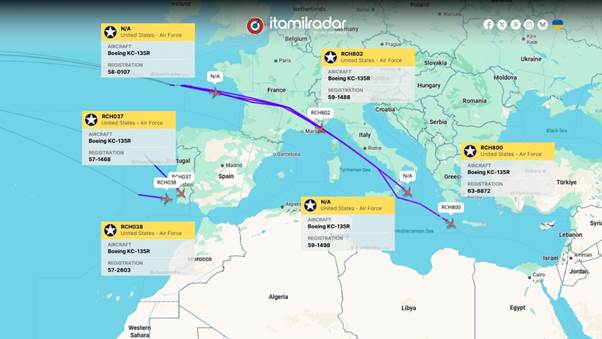
In recent hours, a notable number of US Air Force aerial refuelling aircraft have crossed the Atlantic from the United States to Europe and then to the Middle East, flying either directly to the Gulf region or routing through NAS Rota in Spain, where several of them remain grounded today. The scale and timing of these movements indicate a coordinated reinforcement effort rather than routine tanker traffic.
The image shows only a selection of the aircraft involved overnight, but even this partial photograph highlights the density of KC-135R activity along the southern European axis. Several tankers followed similar west-east routes across the Atlantic, converging over the Iberian Peninsula, southern France and Italy, before continuing eastward to the Mediterranean and beyond. Such patterns are typical of large ferry or support operations, rather than isolated rotations.
At this stage, it is not possible to confirm whether these tankers were escorting or directly supporting fighter aircraft deployments. However, the broader context is significant. In recent days, at least six F-15 fighter jets have arrived directly in the Gulf from the continental United States via RAF Lakenheath. This movement alone required significant air refuelling support and fits well with the wave of fuel observed last night.
It is important to note that the tanker activity is occurring alongside other indicators of a broader adjustment to the US posture in the region. At the same time, additional missile defence systems and aircraft support equipment are being repositioned in the Middle East, a development that likely explains the heavy C-17A Globemaster III traffic recorded overnight. Strategic airlift and tank flows tend to move in parallel during rapid reinforcement phases, especially when air defence and combat aviation assets are involved.
From an operational perspective, the combination of increased tanks, the arrival of fighter aircraft and heavy air transport indicates preparation rather than reaction. Tankers are not deployed in such numbers unless sustained air operations are anticipated, whether for combat air patrols, attack support, or the continuous movement of forces over long distances.
Although no single flight can be considered decisive on its own, the overall picture that emerges today is clear: the United States is strengthening its ability to project and sustain air power in the Middle East. The night-time tank movements are not an isolated anomaly, but part of a broader, multi-layered build-up whose strategic significance lies as much in preparation, endurance and signalling as in immediate operational needs.
Source: here
The French Navy launches the DANAE project to rapidly acquire an armed surface drone
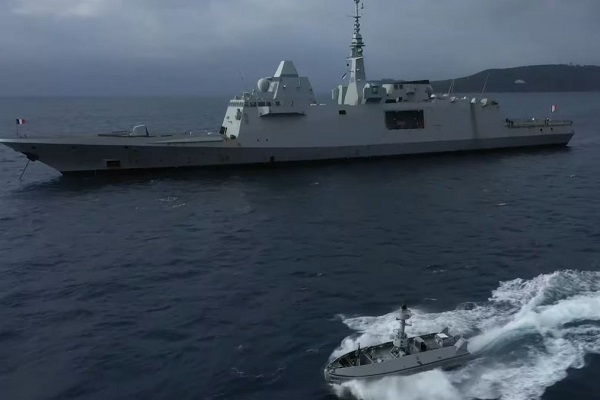
As he recalled during a Senate hearing last November, the Chief of Staff of the French Navy [CEMM], Admiral Nicolas Vaujour, has the same ambition as his British counterpart, namely “to drone whenever possible and keep ‘inhabited’ what is necessary”.
However, while this does not pose insurmountable problems for the air domain, the same cannot be said for naval drones, whether underwater or on the surface.
“Evaluating a drone system means evaluating their operational endurance and deployability. Today’s aerial drones can endure twenty-four hours without any problems: from a technological point of view, operational robustness is being achieved. Underwater drones, on the other hand, do not yet have this robustness… However, an underwater drone must be able to withstand long periods at sea – one day, two days, three days,” Admiral Vaujour said during this hearing. And he asks: “Are we capable of going further?”
This also applies to surface drones [USVs]. “Using a drone for a few hours is easy: some even last a few days. But is an escort drone capable of sailing autonomously for several months? No. Can it last a few weeks? Not yet. A week? Maybe. But if the drone stops working after a week, what do you do? Autonomy is a real issue,” explained the CEMM.
Furthermore, the French Navy’s desire to move quickly into “dronisation” is hampered by the lack of maturity of the proposed systems. “Robustness is not yet fully there,” insisted Admiral Vaujour.
Hence the importance of the unprecedented project, funded by the Defence Innovation Agency (AID), which has just been launched by the French Navy in Saint-Mandrier (Var), with the support of the “Tehniques Navales” expertise and testing centre of the Directorate-General for Armament (DGA).
Called DANAE [from Naval Autonomous Surface Drone with an On-Board Armament Capability], it is an innovation acceleration project [PAI] that aims to provide the French Navy with surface drones capable of protecting naval bases and escorting ships.
“An IAP is designed to accelerate innovation alongside the civil ecosystem. These specific projects aim to capture innovation from the civil market in order to implement it as soon as possible,” says the AID.
This project will take place in three phases. The first, which has just begun, involves seven companies from the Defence Industrial and Technological Base [BITD], namely Keys4sea, Exail, SeaOwl Group, Marine Tech, Thales, SIREHNA [a subsidiary of Naval Group] and SEAir. The systems they have proposed will be evaluated and tested “in terms of navigation performance, resilience and decision-making autonomy [threat detection and management],” explains AID.
At the end of this first phase, the three surface drones with the best capabilities [and/or the greatest potential] will be selected. The prototypes will then be developed according to the requirements expressed by the French Navy. The DANAE project will conclude with the selection of a USV model for series production.
Speaking to senators, Admiral Vaujour described the DANAE project as “crucial”.
“I want us to test these things because we need to be sure of what we are doing: we should not spend money unnecessarily. We must therefore make progress in this area if we want to be able to use such drones in surveillance and intelligence operations, alongside other resources – patrol boats, surface drones, underwater glider drones – and improve the protection of maritime access,” he said.
Source: here
After the naval drone attack, CPC is forced to dismantle the single berth in the port of Novorossiysk
On 20-21 January 2026, Nikolay Gorban, Director General of the Caspian Pipeline Consortium, paid a working visit to the facilities of the Marine Terminal near Novorossiysk.
An inspection was carried out on the condition of the terminal’s land facilities and tank farm, according to the Russian website Media Deck.
Particular attention was paid to the final measures for repairing the SPM CPC-3 single-point mooring. It is noted that this device partially replaces the underwater hoses and underwater hoses of the cargo system since mid-November 2025.
The progress of the buoyancy restoration work and preparations for dismantling the CPC-2 SPM were also monitored. Recall that on 29 November 2025, this device was damaged after an attack by an unmanned vessel.
Source: here
A representative of Rosatom at the IMO session presented a map of Russia with the occupied territories of Ukraine
A representative of the Russian state atomic energy corporation Rosatom used a map with invalid borders of Russia in his presentation.
The incident took place on the sidelines of the 12th session of the International Maritime Organisation (IMO) Subcommittee on Ship Design and Construction, said the head of the Maritime Transport Administration, Mykola Kravchuk, according to USM.
He added that Ukraine’s State Service for Maritime and Inland Navigation Transport strongly condemns the use of a map with invalid borders of the Russian Federation in the presentation “Aspects of the regulation of the safety of nuclear-powered ships and floating power units” given by the Rosatom representative.
As confirmed by the UN General Assembly, as well as IMO resolutions A.1183(33) and MSC.519(106), the Autonomous Republic of Crimea, the city of Sevastopol, Donetsk, Zaporizhzhia, Luhansk and Kherson regions, together with their internal waters and territorial sea, are an integral part of the sovereign territory of Ukraine.
Any attempt by Rosatom to change its internationally recognised status during Russia’s armed aggression against Ukraine — by displaying false maps, seizing the IR-100 research reactor in Sevastopol or conducting unauthorised, extremely dangerous activities at the Zaporizhzhia nuclear power plant — is null and void, the department noted.
The Maritime Administration is convinced that technical discussions on the use of alternative fuels in commercial transport should not come at the expense of peace, global nuclear safety, and fundamental principles of international law.
Source: here
The Bundeswehr is preparing for a major acquisition: three warships for the German fleet
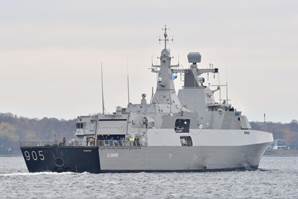
The Egyptian Navy’s Meko 200-class frigate AL-QAHHAR arrives in the port of Kiel, Germany, for sea exercises on 17 November 2022. PHOTO: Martin Witte / Alamy / Profimedia
The German army is preparing to purchase at least three MEKO A-200 class frigates from German warship builder TKMS, each with a price tag of around €1 billion (or $1.17 billion) , according to sources familiar with the project, Reuters news agency reported on Wednesday.
These sources said that the German parliament had been informed of a preliminary agreement and that the formal purchase contract was being prepared by the Berlin government.
TKMS could deliver the first frigate by 2029, as requested by the Bundeswehr (German army), with subsequent deliveries to be made in less than a year, according to the sources.
The budget committee approved €7.8 billion last year for an alternative procurement strategy after a delay of several years in the procurement of the originally planned F126 frigates.
The specialist publication Hartpunkt was the first to report on these plans by the German army.
The German Ministry of Defence has not yet commented on this matter.
Source: here